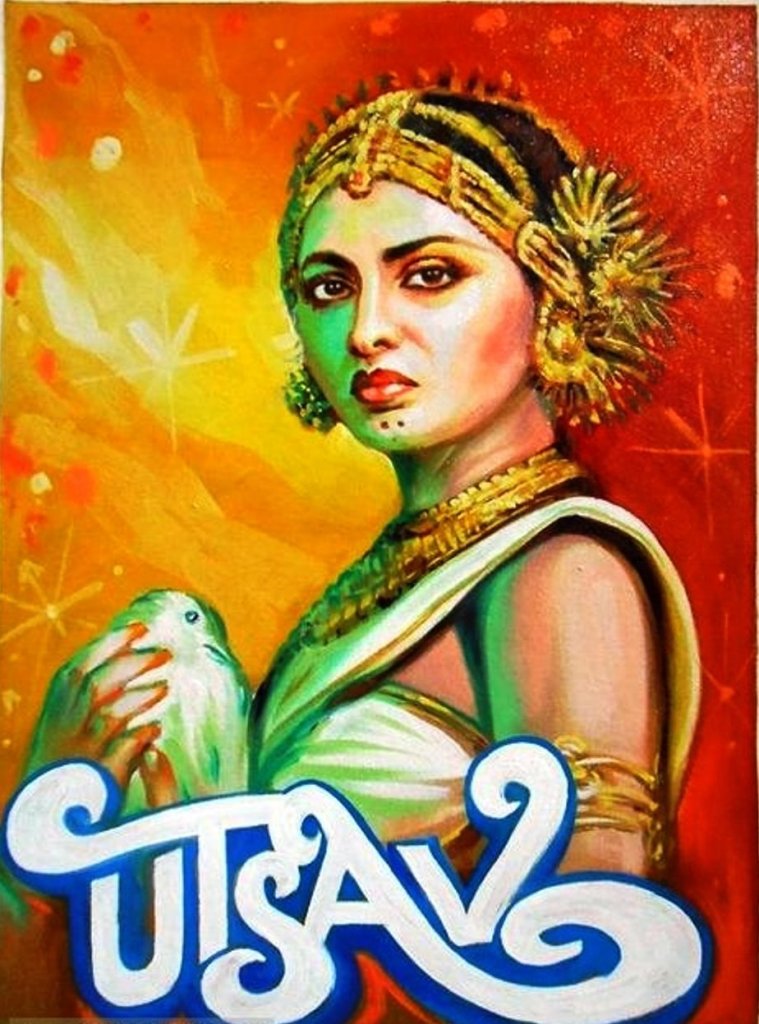
| Directed by | Girish Karnad |
|---|---|
| Produced by | Shashi Kapoor |
| Written by | Krishna Basrur, Girish Karnad (Screenplay) Sharad Joshi (Dialogue) |
| Based on | Mrichakatika by Śūdraka |
| Starring | Shankar Nag Rekha Anuradha Patel Amjad Khan Shashi Kapoor Shekhar Suman |
| Narrated by | Amjad Khan |
| Music by | Laxmikant Pyarelal Lyrics: Vasant Dev |
| Cinematography | Ashok Mehta |
| Edited by | Bhaudas Divakar |
| Release date | 21 December 1984 |
| Running time | 145 minutes |
| Country | India |
| Language | Hindi |
We finally come to the first review of the one of the greatest musical duos in Bollywood history, Laxmikant Pyarelal. The period between 1941 – 1970 has been touted by many Bollywood music experts as the ‘Golden Age‘ of Indian Film Music. No doubt so, the artists, composers and musicians laid the foundations of the musical fraternity. Taking music from the ‘silent’ era to the ‘talkies’ and there was no stopping there. It continued and survived a country torn by war, eventually there were some casualties because of that, but the music in that time period has truly stood the test of time.
During the far end of of this Golden Age we were lucky that two young budding composers got their maiden break. In a world filled with melody, and rousing scores, they carved a name for themselves. A tough and brave thing to do, knowing what the state of music is today. In fact today’s noise makers would have drowned out far too quickly; you had to have some background in classical music, knowledge about instruments, and even a treasure trove full of intellect to understand the subject nature of the compositions. Judging by that, today’s so called “music makers” would have been at a complete loss for creativity.
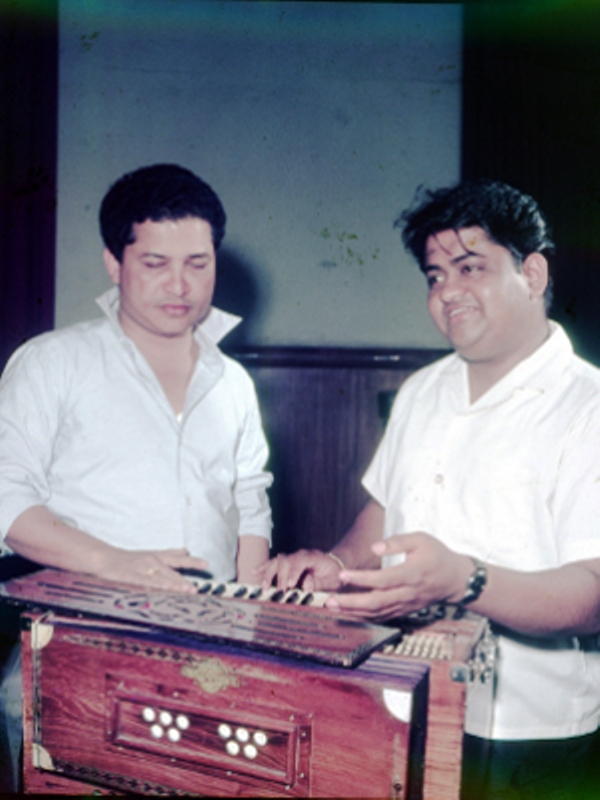
A commonly known story about the beginnings of the fantastic duo, Laxmikant Pyarelal, is know far and wide, but let me narrate it for the readers of this review that do not know.
Laxmikant Shantaram Kudalkar (b.1937) learned to play the mandolin from his guru Ustad Hussain Ali at young age to fend for his family, after he had lost father. Pyarelal Ramprasad Sharma (b.1940) got his violin training from his musician father Ramprasad Sharma who was also an ace trumpeter. Both of them began their careers by playing in orchestras for film music. They both managed to get a ‘promotion’ as music arrangers for music directors Kalyanji Anandji for a few years. They eventually got their first break in Babubhai Mistry’s Parasmani (1963). Their rousing score made them an overnight success. The following year seen them rise to the stars with gargantuan success of Dosti (1964); they received almost all the awards for the melodious and poignant score. They had made their mark and there was no stopping them, in-fact right up until their last score, the delayed 2004 release ‘Meri Biwi Ka Jawaab Nahin‘ – they had produced stellar music that had a tune for everybody. Their tunes were simple enough for the common man, yet the classes knew how intricate those ‘simple’ tunes were orchestrated. they had given rise to so many new trends post the 1970’s that had allowed them to stay ahead of rest.
During the 80’s and 90’s as well, when new Music directors had been coming through in drones, they still maintained their supremacy with the likes of Kalyanji Anandji, R. D. Burman and Khayyam still composing. They not only composed music that adapted to the time periods, but also music that will be remembered for their beautiful renditions and orchestration.
Here in South Africa, there is a top 20 countdown of hits every year end for song of the year (Lotus FM), and in the ’90s Laxmikant Pyarelal managed to win the top spot twice! in 1991 for Jumma Chooma De De (Hum) and in 1993 for Choli Ke Peeche Kya Hai (Khal Nayak). A great feat for composers whose careers began in 1963! And i am sure this was the case all around the world.
They also shared a great rapport with many film-makers that lasted all through their careers and gave these film-makers hits upon hits that propelled the usual run-of-the-mill films. They also made stars out of particular actors with their music, giving them music that became international mega blockbusters, one such example would be Madhuri Dixit – their music helped propel her career to the stars, lets just take these two songs in reference; ‘Ek Do Teen‘ from Tezaab and ‘Choli Ke Peeche Kya Hai‘ from Khal Nayak. There are a plethora of other actors / actresses that had also benefited from this duo’s creative minds. In their career of an astounding 500+ films Laxmikant Pyarelal managed to stay constant, delivering beautiful music to the world.
Whilst the mostly popular trends were being vacuumed into movies, Laxmikant Pyarelal knew how to add melody, that was the difference! Their knowledge of classical music had been proved in majority of their soundtracks and these are particular classical standouts for me are:
- Parasmani (1963)
- Milan (1967)
- Ek Nazar (1972)
- Satyam Shivam Sundaram (1978)
- Main Tulsi Tere Aangan Ki (1978)
- Sargam (1979)
- Dawedaar (1982)
- Ek Nai Paheli (1984)
- Utsav (1984)
- Yeh Ishq Nahin Aasaan (1984)
- Sur Sangam (1985)
- Nache Mayuri (1986)
- Batwara (1989)
- Bhairavi (1996)
From these i have chosen Utsav to focus on, mainly because at a time when there was a dearth of melody and an influx of disco soundtracks, we got to hear a soundtrack that concentrated on the period it was meant to be filmed in, and melody mellifluously flowing. We had the likes of Lataji and Ashaji including much more of the current hit singers in just 4 songs and 3 instrumental pieces that create a great mind aesthetic.
The film is an adaptation of Mṛcchakatika (The Little Clay Cart), a ten-act Sanskrit drama attributed to Śūdraka, an ancient playwright generally thought to have lived sometime between the second century BC and the fifth century AD whom the prologue identifies as a Kshatriya king and a devotee of Siva who lived for 100 years. The play is set in the ancient city of Ujjayini during the reign of the King Pālaka, near the end of the Pradyota dynasty that made up the first quarter of the fifth century BC.
Tracklist
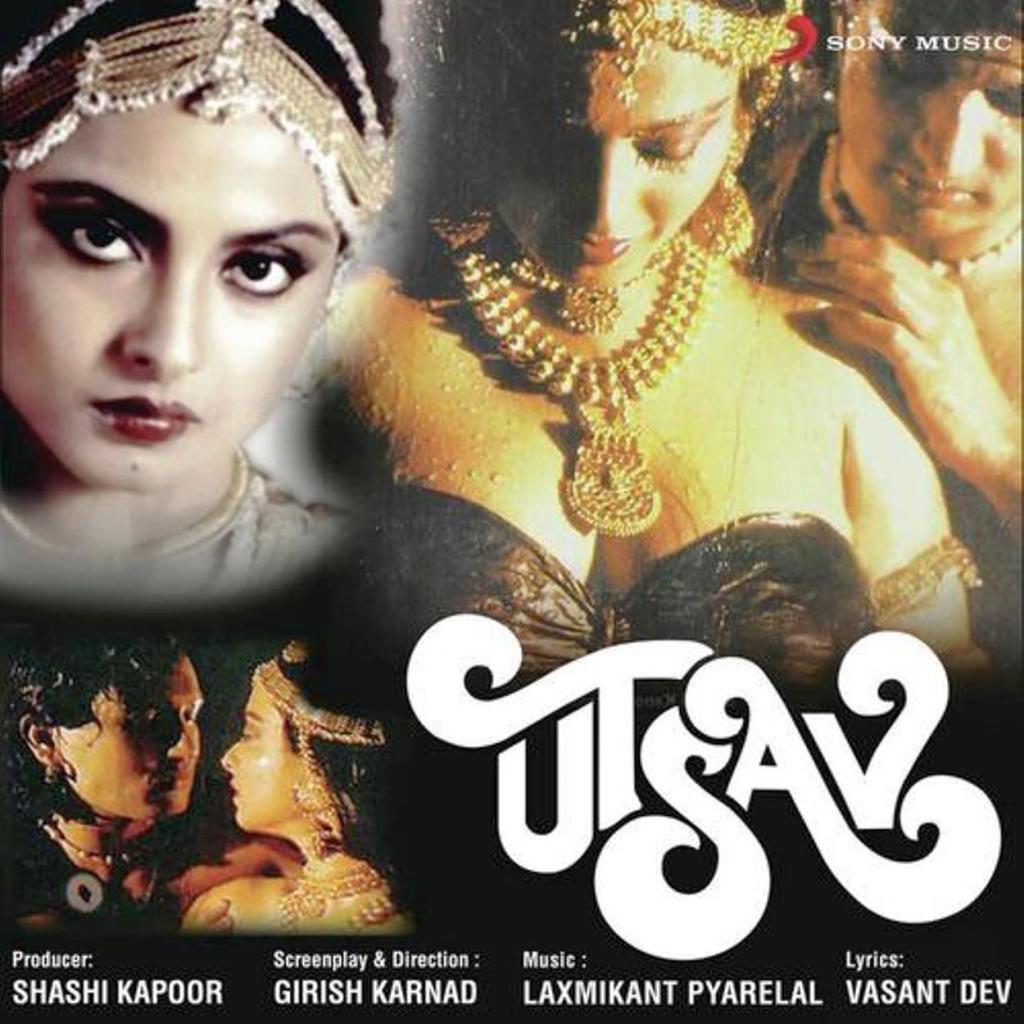
| No. | Song | Artists | Duration |
| 1 | Man Kyoon Behka Ri Behka Aadhi Raat Ko | Lata Mangeshkar & Asha Bhosle | 5:41 |
| 2 | Neelam Pe Nabh Chhayee Pukharaji Jhanki | Lata Mangeshkar | 3:45 |
| 3 | Incidental Music | Laxmikant Pyarelal | 2:51 |
| 4 | Saanj Dhale Gagan Tale Hum Kitane Ekaki | Suresh Wadkar | 4:13 |
| 5 | Mere Man Baaja Mirdang Manjira Khanke Re Ang Ang | Suresh Wadkar, Anuradha Paudwal, Aarti Mukherjee, Udit Narayan And Chorus | 7:37 |
| 6 | Incidental Music | Laxmikant Pyarelal | 2:46 |
| Total Duration | 26:53 |

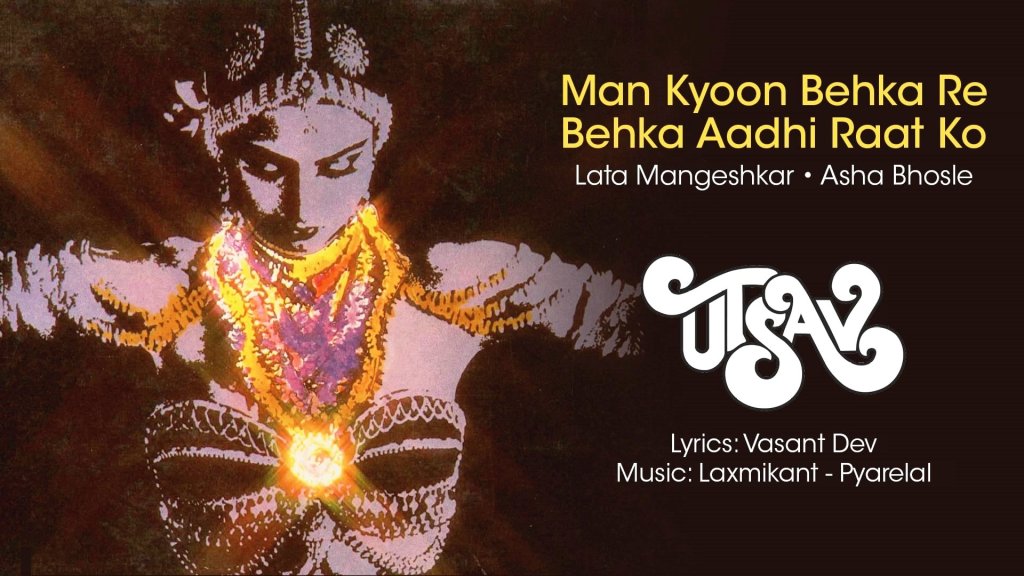
In what begins as the most melodious track of Utsav, ‘Man Kyoon Behka Ri Behka Aadhi Raat Ko‘, is in fact the most melodious song of 1984; a treasure to behold. Firstly, we have Latabai and Ashatai in dulcet duet that lingers long on the soul afterwards. Secondly, Laxmikant Pyarelal have tuned this track with minimal instruments. It is instantly lovable and enjoyable. Before the days of auto tune, we had a fantastic display of talent, don’t believe me? Hear the opening 30 seconds of this song where Latabai and Ashatai sing accapella. First a hum, then the opening lines. The impact is instant; the tune semi-classical and is not defined by any Raga scales. That’s the beauty of Laxmikant Pyarelal right there.
Man Kyoon Behka Re Behka
Why Is My Mind So Uneasy
Man Kyoon Behka Re Behka Aadhi Raat Ko
Why Is My Mind So Uneasy At Midnight?
Bela Mehka Ho
Because The Jasmine Gets Muskier
Bela Mehka Re Mehka Aadhi Raat Ko
Because The Jasmine Gets Muskier At Midnight.
Kisne Bansi Bajaayi Aadhi Raat Ko
Who Breathed Music Into Flute At Midnight?
Ho Kisne Bansi Bajaayi Aadhi Raat Ko
Who Breathed Music Into Flute At Midnight?
Jisne Palkein Ho
The One Who Robbed Sleep Off The Eyelids
Jisne Palkein Churaayi Aadhi Raat Ko
The One Who Robbed Sleep Off The Eyelids At Midnight.
Jhanjhar Jhamke Sun Jhamke
Anklets Dance And Tinkle
Ho Jhanjhar Jhamke Sun Jhamke
Yes, They Jingle And Tinkle
Jhanjhar Jhamke Sun Jhamke Aadhi Raat Ko
Anklets Dance And Tinkle At Midnight
Usko Toko Na Roko, Roko Na Toko
Don’t Stop Them, Please, Don’t Even Interrupt Them
Toko Na Roko Aadhi Raat Ko
Don’t Stop Them, Please, Don’t Even Interrupt Them
Ho Laaj Lage Re Laage Aadhi Raat Ko
Oh, Shyness Tiptoes Over Me, At Midnight.
Laaj Lage Re Laage Aadhi Raat Ko
Shyness Tiptoes Over Me, At Midnight.
Dena Sindoor Ke Soun Aadhi Raat Ko
Just Make It Swear By The Vermilion, At Midnight.
Bela Mehka Re Mehka Aadhi Raat Ko
Because The Jasmine Gets Muskier At Midnight.
Man Kyoon Behka Re Behka Aadhi Raat Ko
Why Is My Mind So Uneasy At Midnight?
Bela Mehka Re Mehka Aadhi Raat Ko
Because The Jasmine Gets Muskier At Midnight.
Baat Kehte Bane Kya Aadhi Raat Ko
Words Remain Motionless On My Lips,At Midnight.
Aankh Kholegi Baat Aadhi Raat Ko
Wait A Bit, They Will Awake, At Midnight.
Baat Kehte Bane Kya Aadhi Raat Ko
Words Remain Motionless On My Lips,At Midnight.
Aankh Kholegi Baat Aadhi Raat Ko
Wait A Bit, They Will Awake, At Midnight.
Humne Pee Chandni Aadhi Raat Ko Ho Ho
We Sipped On Moon-Gleam, At Midnight.
Humne Pee Chandni Aadhi Raat Ko
We Sipped On Moon-Gleam, At Midnight.
Chaand Aankhon Mein Aaya Aadhi Raat Ko
And The Moon Rose In Our Eyes, At Midnight.
Bela Mehka Re Mehka Aadhi Raat Ko
Because The Jasmine Gets Muskier At Midnight.
Man Kyoon Behka Re Behka Aadhi Raat Ko
Why Is My Mind So Uneasy At Midnight?
Bela Mehka Re Mehka Aadhi Raat Ko
Because The Jasmine Gets Muskier At Midnight.
Raat Gunte Rahegi Aadhi Baat Ko
Midnight Evokes Half-Spoken Words
Aadhi Baaton Ki Peer Aadhi Raat Ko
The Agony Of Those Unseen Worlds
Raat Gunte Rahegi Aadhi Baat Ko
Midnight Evokes Half-Spoken Words
Aadhi Baaton Ki Peer Aadhi Raat Ko
The Agony Of Those Unseen Worlds
Baat Poori Ho Kaisi Aadhi Raat Ko
How To Fulfill A Talk At Midnight?
Raat Hoti Ho, Raat Hoti Shuru Hai Aadhi Raat Ko
My Dear, Real Conversations Dawn, Only At Midnight.
Man Kyoon Behka Re Behka Aadhi Raat Ko
Why Is My Mind So Uneasy At Midnight?
Bela Mehka Re Mehka Aadhi Raat Ko
Because The Jasmine Gets Muskier At Midnight.
Man Kyoon Behka Re Behka
Why Is My Mind So Uneasy
Bela Mehka Re Mehka
Because The Jasmine Gets Muskier
Man Kyoon Behka
Why Is My Mind So Uneasy
Bela Mehka
Jasmine Gets Muskier
Man Kyoon Behka
Why Is My Mind So Uneasy
Bela Mehka
Jasmine Gets Muskier
Lyrcist Vasant Dev won the FilmFare award for best lyrics for this song in 1984, it’s a beautifully written conversation between two women unearthing their feelings of desire, and while it is quite simple to understand, the imagery and metaphors speak bounds about it’s beautiful suggestive meaning.
Hear this sumptuous duet, and it wonders me that a 55 year old Latabai and 51 year old Ashatai, helm the singing; both sound like 20 year old lasses belting out the notes of this duet with pristine precision. From the beginning whispers to the high notes, they are both fantastic and relay their emotions with conviction. Listen to the way they emphasise certain lyrics to attain it’s true nature; they way they answer each other sharing a huge musical sound-stage without ever overshadowing each other. The question always was Who sang better? I can, with hand on heart, say that they are both equally brilliant in their renditions. This song remains a loved track from early 1980’s due to its simple structure and easy flow.
What’s even better to note is that the tune flows so easily due to the expertise of Laxmikant Pyarelal. They knew how to use Latabai and Ashatai to maximum melody; this is proven with the fact that the track has no less than five instruments. Ghatam, Tabla, Clarinet are mainly used throughout the track, with a sitar and sarod flourish that is used introduce the antaras. The singing remains fore. Laxmikant Pyarelal achieved this feat many times, using both Latabai and Ashatai in the most duets by the sisters. These were the masters of their field, such great rapport between the composers always came across in their music. It is for this reason that we miss such beautiful creativity in these times.


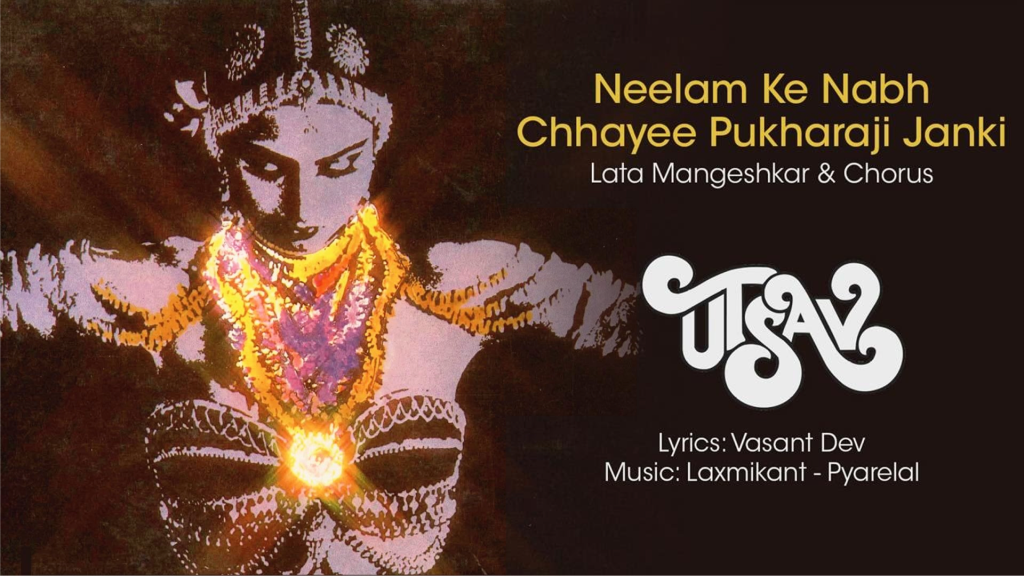
Next up we have the luxurious ‘Neelam Pe Nabh Chhayee‘, based on Raga Vibhas. Whilst most of the physical media of Utsav claims that this is a duet between Latabai and Ashatai; this is really just a ‘Solo + Chorus’ song with Latabai helming the singing. Ashatai does not appear in this song and the printing mistake seems to have been carried through on all media formats. Whereas the first song, is a semi-classical song created out of the minds of the versatile Laxmikant Pyarelal, here the duo expand Raga Vibhas so vivaciously, so exotically spellbinding. Raga Vibhas is a very heavy Raga, that usually delves on the devotional side, but this is the magic of Laxmikant Pyarelal once again. In this song, there is a certain playfulness that is imbued through its rendition; the Raga does show its heavy side too, but it is handled with utmost care and seamless interpretation.
Latabai again starts acapella, with the humming of the Aaroha – Avarohana in Raga Vibhas; then soaks in the lyrics: ‘Neelam Ke Nabh Chhayee‘ with a sweet tonal effervescence. Immediately you hear the depth of Vibhas as Latabai croons the rest of the mukhda lyric. Slight harp touches are infused into Latabai’s acapella alaap. As if in a whirlwind, Latabai moves straight to taar saptak and infuses a joyful mood, stunned by a thought, which the lyric by Vasant Dev conveys. Listen to how the flute and a light drum beat conveys the thought as well just after the lyric verse is sung.
The first antara begins immediately after the introduction, in this short while, we are introduced to the main instrument that Laxmikant Pyarelal will use as percussion; hand claps – so ingeniously suffused into the core of the song. The all-female chorus ably provides the necessary chhed-chhaad, and also creates a loving sound as Latabai answers them. You have got to hand to Laxmikant Pyarelal for creating such an invigorating song out of Raga Vibhas. What’s even more special is he way the lyric ‘Ghuli Ghuli Benjaniya Sapno Mein Ek Kali Itne Mein Mor Pankh Paras Huwa‘ is conveyed by repetition; first time almost spoken by Latabai and the second time sung through Raga Vibhas with brilliant precision. Creativity is at full momentum here, the all-female chorus end the antara with the Jal tarang and Tabla aiding them.
The second and final antara is introduced by the Tabla and Ghungroo which support the next lyric line, cleverly creating a wholesome experience. The most special portion comes where Latabai serenades with the lyric ‘Saat Suro Wala‘, it is done encompassing the full set of notes of the Raga Vibhas Avarohana – Sa, Dha, Pa, Ga, Re, Sa – Pure magic related to us listeners through the enchanting composition of Laxmikant Pyarelal’s minds. The anatara again ends with the all-female chorus and Lata’s soulful alaps.
Neelam Ke Nabh Chhayi Pukharaji Jhanki
The Midnight Sky Laid Out In Hues Of Sapphire, The Yellow Moon, Motionless
Mere To Nainon Mein Kirnon Ke Pankhi
Gleaming Rays Of Light Satisfying My Eyes
Paati Ki Godi Mein Soyi Thi Ek Kali
In The Lap Of The Leaves, Slept A Blossom
Kaise Soyi Hogi Kali
How Did The Blossom Sleep?
Jaise Soyi Meri Lali
Just Like My Beloved Sleeps
Kali Hili
Was The Blossom Restless?
Um Hmmmm
Um Hmmmm
Kali Doli
Did The Blossom Dance?
Na Na
No No
Ghuli Ghuli Benjaniya Sapno Mein Ek Kali Itne Mein Mor Pankh Paras Huwa
The Blossom Slept Like A Child Embraced, Lost In Dreams, Touched By A Peacock Feather, She Awoke
Ghuli Ghuli Benjaniya Sapno Mein Ek Kali Itne Mein Mor Pankh Paras Huwa
The Blossom Slept Like A Child Embraced, Lost In Dreams, Touched By A Peacock Feather, She Awoke
Kaha Kaha Pe Chhua Ri
Where Oh Where, Did The Feather Touch The Blossom?
Zara Ise To Bata Ri
Tell Us This At Least
Galo Par
On Your Cheek?
Um Hmmmm
Um Hmmmm
Balo Par
On Your Hair?
Na Na
No No
Itne Mein Mor Pankh Paras Huwa Palko Par Jadu Se Phool Bani Ek Kali Champa Ki
The Feather Lovingly Kissed The Blossom, And It Became A Magical Flower Blossomed Out Of The Lotus
Sach Iske Nainon Mein Kirnon Ke Pankhi
Truly, Your Eyes Reflect This Gleaming Rays Of Light
Sach Iske Nainon Mein Kirnon Ke Pankhi
Truly, Your Eyes Reflect This Gleaming Rays Of Light
Champa Ke Paao Mein Ghungaru Aagaaye
At The Feet Of The Lotus The Blossom’s Dancing Bells Emerged
Champa Ke Paao Mein Ghungaru Aagaaye
At The Feet Of The Lotus The Blossom’s Dancing Bells Emerged
Tehani Ne Taal Diya
Freed By Its Beats
Thirak Thirak Lehraye
Like A Whirling Wave
Bhanware Ka Gandh Git Saat Suro Wala
Driven Crazy By The Happy Intoxication And Its Seven Melodious Notes
Sant Kar Aane Ka Hosh Kise Baki
Whats’s The Need To Forsake This Intoxication?
Hum Sabke Nainon Mein Kirno Ke Pankhi
We Too, Feel This Gleaming Rays Of Light In Our Eyes
Hum Sabke Nainon Mein Kirno Ke Pankhi
We Too, Feel This Gleaming Rays Of Light In Our Eyes
Hum Sabke Nainon Mein Kirno Ke Pankhi
We Too, Feel This Gleaming Rays Of Light In Our Eyes


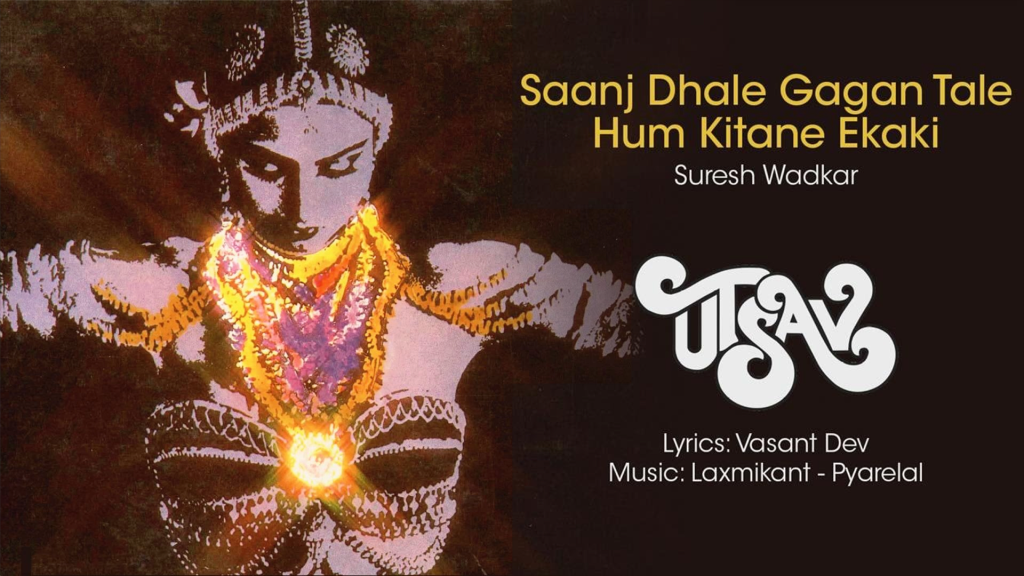
In the film, ‘Sanjh Dhale Gagan Tale‘ is the first song that takes place, and the one that allows the narrative to flourish, the song had to be impactful, soulful and be able to make the listener yearn, just so we understand the characters and the emotional flow of the narrative. Vasantsena (Rekha) stumbles across Charudutta (Shekhar Suman) while she is on her way, Charudutta is reciting his poem, and she is drawn to his poetic melody. The poem expresses ‘loneliness’, and dictates to the listener through floral imagery how intense his feelings are. Vasant Dev once again paints spectacular canvas that proves to match the melody created by Laxmikant Pyarelal.
‘Neelam Ke Nabh Chhayee‘ comes after this song in the film and is a reply to Charudutta’s ‘Sanjh Dhale’s‘ loneliness. Interestingly both these songs are based on Raga Vibhas, however, due to its rigid structure of following the Raga precisely ‘Sanjh Dhale Gagan Tale‘ is the pièce de résistance of Utsav; and all kudos go to Laxmikant Pyarelal. Essentially what we have here is a rare Raga being used, not once, but twice in a soundtrack. Laxmikant Pyarelal also exhibit how the Raga can used to display two different moods, evoking the most innate intimate emotions in both instances. When composers of this calibre could easily render these songs so naturally, without even a hint of error, do you still have to wonder at what a loss we are in today? I will repeat what I’ve said in many previous reviews, that with such a great heritage at new-age composers’ behest, they still feel it necessary to mete out discordant tracks that have no shelf life.
Suresh Wadkar – what can one say about Suresh to properly evaluate the value he brings to this song with his voice. I don’t think there could be enough adjectives in the dictionary to describe what texture Suresh Wadkar delivers. His voice evokes in us the very pathos of Charudutta’s poem, the allure of the lyrics are delivered with pristine rendition, and the notes of Raga Vibhas are in full color display which lifts this fantastic Laxmikant Pyarelal composition to the next level.
I mentioned that Raga Vibhas has a very hypnotic feel, with this song you will experience it as Laxmikant Pyarelal make sure its mood is conveyed righteously. Suresh Wadkar starts with the mukhda, immediately a beautiful sense of despair overcomes you, the Tanpura and Ghatam providing poignant support. Suresh’s voice flows with the darkness of the night and we can instantly feel the time and place the song has been placed in.
An anxious Santoor joins the expressive Jal Tarang and forlorn Flute to introduce the first antara; but listen to the Flute, it will carry your heart away! So expressive in this short time. A slight usage of the Tabla and Sitar further seduces the mind, but yet again Its when Suresh sings, that takes the song to the next level. Observe the structure of the antara; Suresh sings the Aarohana – Avarohana six times (with the superb Sitar flourishes) before he hits the crescendo in Taar Saptak singing the line ‘Itne Mein Timir Dhasa‘ which then again moves straight to Madhya saptak. How marvellous! When you understand how the interaction between the notes of Raga Vibhas are worked in this song, you will understand the expertise of Laxmikant Pyarelal and Suresh Wadkar.
The Sitar introduces the next antara with the sweet sound of morning dew, which moves to the Santoor collecting the dew drops. The same format is applied to this antara and Suresh works his brilliance here too. The interplay between the Sitar, Jal Tarang and vocals also make for class listening. The song ends with the mukhda; Suresh renders the night asunder as his lingering voice whispers the final verse.
Saanjh Dhale Gagan Tale
As The Dusk Sets In
Saanjh Dhale Gagan Tale Hum Kitne Ekaaki
As The Dusk Sets In, I Feel So Lonely.
Chhod Chaley Nainon Ko Kiranon Ke Paakhi
The Rays Of Light Are Forsaking My Eyes.
Saanjh Dhale Gagan Tale Hum Kitne Ekaaki
As The Dusk Sets In, I Feel So Lonely.
Paati Ki Jaali Se Jhaank Rahi Thi Kaliyan
The Blossoms Peeked In Through The Cascade Of Leaves
Paati Ki Jaali Se Jhaank Rahi Thi Kaliyan
The Blossoms Peeked In Through The Cascade Of Leaves
Gandh Bhari Gungun Mein Magan Hui Thi Kaliyan
Those Very Blossoms Intoxicated By The Aroma Of Nectar Summoned By The Bees
Itne Mein Timir Dhasa Sapnile Nainon Mein
My Dreamy Eyes Enveloped By The Night’s Darkness All Over.
Kaliyon Ke Aansoo Ka Koi Nahi Saakhi
No Witness To The Teardrops (Dew Drops) Form On The Blossoms
Chhod Chaley Nainon Ko Kiranon Ke Paakhi
The Rays Of Light Are Forsaking My Eyes.
Saanjh Dhale Gagan Tale Hum Kitne Ekaaki
As The Dusk Sets In, I Feel So Lonely.
Jugnu Ka Pat Odhe Aayegi Raat Abhi
The Night Will Reappear With A Veil Of Fireflies
Jugnu Ka Pat Odhe Aayegi Raat Abhi
The Night Will Reappear With A Veil Of Fireflies
Nishigandha Ke Sur Mein Keh Degi Baat Sabhi
And Will Melodiously Expose Its Desires With Sweet Intoxication
Nishigandha Ke Sur Mein Keh Degi Baat Sabhi
And Will Melodiously Expose Its Desires With Sweet Intoxication
Taptaa Hai Mann Jaise Daali Ambvaa Ki
My Mind Trembles / Undulates Like The Branch Of A Mango Tree
Chhod Chaley Nainon Ko Kiranon Ke Paakhi
The Rays Of Light Are Forsaking My Eyes.
Saanjh Dhale Gagan Tale Hum Kitne Ekaaki
As The Dusk Sets In, I Feel So Lonely.
Saanjh Dhale Gagan Tale Hum Kitne Ekaaki
As The Dusk Sets In, I Feel So Lonely.


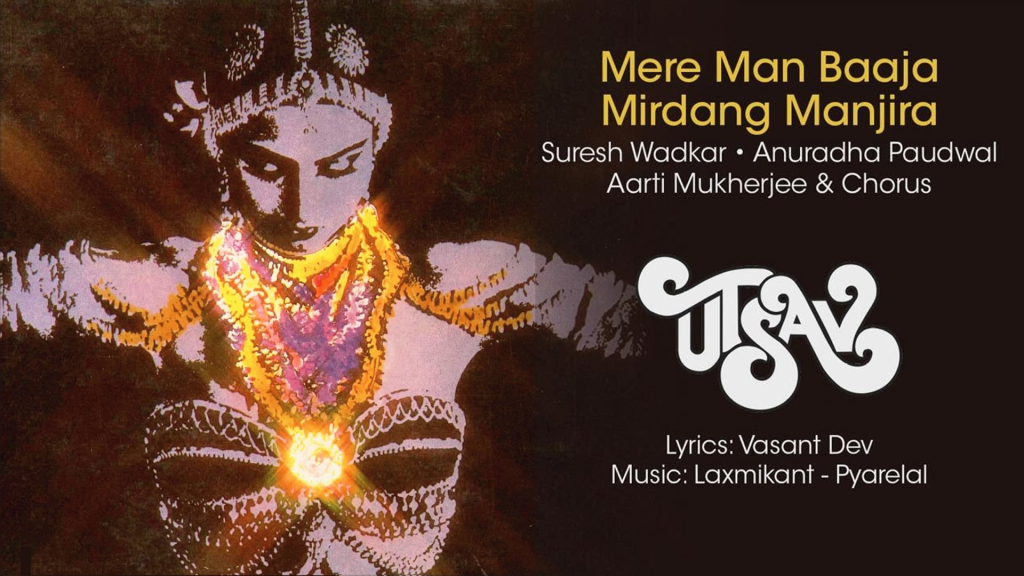
We come to final vocal song of Utsav, and like the title suggests It is an Utsav (Festival). Springing with energy and fervour, ‘Mere Man Baaja Mridang‘ is another gem to treasure. Once again, there was a mistake on the physical media releases, they mention three singers and a chorus, but they have omitted a quintessential singer, whose career began a mere two year before this song; Udit Narayan. He only has two lines, but there is no doubt this was the voice of the young Udit Narayan. Suresh Wadkar, Anuradha Paudwal and Aarti Mukherjee are credited as the singers, and in tandem share a beautiful sound stage, thanks to Laxmikant Pyarelal. Anuradha Paudwal won the Filmfare Best female singer in 1984 for this song, and no wonder why. She is exemplary here. Lyricist Vasant Dev leaves no stone unturned as well; his lyrics are heavily suggestive, but in due right, as we all know What Utsav was all about especially Vatsyayan played by Amjad Khan.
Special mention must be made to Laxmikant Pyarelal here again, understanding the time period of the film to give a measured score to match the timings is of dire importance, it also allows the audience to feel apart of the feature. They have done this and even more. Look at all the instruments they used in all the songs, it is of that exact nature. If you had any doubt at Their percussion mastery, listen to this song, all your doubts will evaporate. They create a boundless timepieces with various percussion instruments that flow as naturally as a river flows.
The track begins with the Mridang (Pakhawaj), Dhol, Tabla and Manjira beating rhythm into our hearts and the chorus flowing with laughter; the setting for a Festival laid into our imaginations. The Chorus introduces us to the Mukhda, but this is also measured, there is an All-Male and All Female Chorus that take turns to sing the Mukhda. This was another speciality of Laxmikant Pyarelal who used the chorus most effectively. The three credited singers take turns singing the same lyric, and its effect is beautiful. We hear Suresh Wadkar, Anuradha Paudwal and Aarti Mukherjee crooning ever so energetic. There are no string or wind instruments here, just percussion
The Interlude before the first antara begins with the Pakhwaj and the Shehnai singing heaps of energy into the festival. Suresh Wadkar is heard ‘Aha Aha Aha‘ . A two-layered Shehnai piece so meticulously put together plays; creating the vibe of the wedding. But hear the tabla and percussion with a few drums before the singers begin, Magic! Suresh Wadkar And Anuradha Paudwal start the Chhed-Chaad in full form, dishing out replies with the chorus as support. When the antara flows back into the chorus, it is interspersed with great liveliness and vigour.
The next interlude is nothing short of spectacular, we hear the Veena strings plucked suffused Manjira and Jal Tarang, Trumpets bellow out notes with various Drums, the Shehnai reappears. Again another percussion rhythmic pattern flows, hypnotic, as the chorus screams out ‘Hey Hey‘. Suresh Wadkar begins, but wait, this antara is not composed like the first one. A different melody ensues. It is in this antara we her the voice of Udit Narayan singing the two lines ‘Jhuk Jhum Rahi Nahi Bhul Rahi, Teri Chaal Gajab Baurani Hai‘ and ‘Mile Ang-Ang Jaise Jal Mein Rang, Hum Ho Anang Man Bhaya Re‘. He does so on par with Suresh Wadkar.
The next interlude begins with Dandia, Manjira and Jal Tarang, Shehnai and Tumpets, and again the Veena; Energy flowing to the skies. It is probably this antara that got Anuradha Paudwal her FilmFare award; she is fantastic. Her voice carries the melody with blazing torches in her rendition. Laxmikant Pyarelal, no doubt carve out a special vocal creation for her. Hear these lines: ‘Sah Lungi Saiyyan Ki Sijariya Piya, Ise Joban Ka Ras To Chadha Do Piya‘ and the alaps that follows. A masterwork in learning music, take a Bow! Laxmikant Pyarelal gave Anuradha many melodious hits, they knew her worth. If Only she didn’t side with T-Series and the whole re-dubbing catastrophe, she would have seen much bigger success. The vocal portions ends off with chorus singing and Anuradha’s soulful alaps. Truly a one-of-a-kind song.
Percussion is is full flow, with the chorus and it roars with vivacious energy right until the Shank (Conch) is blown. A masterpiece!
Mere Man Baaja Mridang Manjira Khankhe Re Ang-Ang
The Mridang (Drum) Beats Flow To My Heart And The Manjira (Cymbal) Sways My Body
Ajab Mad Chhaya Re Madan Rang Laya Re
When The Sweet Shades Flow And The God Of Love Brings His Colourful Hues
Mere Man Baaja Mridang Manjira Khankhe Re Ang-Ang
The Mridang (Drum) Beats Flow To My Heart And The Manjira (Cymbal) Sways My Body
Ajab Mad Chhaya Re Madan Rang Laya Re
When The Sweet Shades Flow And The God Of Love Brings His Colourful Hues
Mere Man Baaja Mridang Manjira Khankhe Re Ang-Ang
The Mridang (Drum) Beats Flow To My Heart And The Manjira (Cymbal) Sways My Body
Ajab Mad Chhaya Re Madan Rang Laya Re
When The Sweet Shades Flow And The God Of Love Brings His Colourful Hues
Mere Man Baaja Mridang Manjira Khankhe Re Ang-Ang
The Mridang (Drum) Beats Flow To My Heart And The Manjira (Cymbal) Sways My Body
Ajab Mad Chhaya Re Madan Rang Laya Re
When The Sweet Shades Flow And The God Of Love Brings His Colourful Hues
Mere Man Baaja Mridang Manjira Khankhe Re Ang-Ang
The Mridang (Drum) Beats Flow To My Heart And The Manjira (Cymbal) Sways My Body
Ajab Mad Chhaya Re Madan Rang Laya Re
When The Sweet Shades Flow And The God Of Love Brings His Colourful Hues
Mere Man Baaja Mridang Manjira Khankhe Re Ang-Ang
The Mridang (Drum) Beats Flow To My Heart And The Manjira (Cymbal) Sways My Body
Ajab Mad Chhaya Re Madan Rang Laya Re
When The Sweet Shades Flow And The God Of Love Brings His Colourful Hues
Ahaa Ahaa Ahaa
Ahaa Ahaa Ahaa
Gori O Gori Aai Kar Ke Tu Chori
O, The Fair Maidens Have Arrived For Us To Steal A Glance
Gori O Gori Aai Kar Ke Tu Chori
O, The Fair Maidens Have Arrived For Us To Steal A Glance
Bol Aanchal Tale Kya Chhupai Ri
Tell, What Are You Hiding Under Your Veil
Kachhi Umariya Hai Ochhi Chunariya Hai
Fragile Youth Under Dishevelled Veils
Kachhi Umariya Hai Ochhi Chunariya Hai
Fragile Youth Under Dishevelled Veils
Main Kaise To Joban Chhupaun Ri
O, How To Hide The Bloom Flush Of Youth
Gori O Gori Hum To Pakadege Chori
O Fair Maidens, We Will Stealthily Catch You
De De Sidhe Se Tune Jo Chhupaya Ri
Give Us What You Are Hiding
O Madan Rang Laya Re
O God Of Love Bring Your Colourful Hues
Mere Man Baja Mridang Manjira Khankhe Re Ang-Ang
The Mridang (Drum) Beats Flow To My Heart And The Manjira (Cymbal) Sways My Body
Ajab Mad Chhaya Re Madan Rang Laya Re
When The Sweet Shades Flow And The God Of Love Brings His Colourful Hues
Mere Man Baja Mridang Manjira Khankhe Re Ang-Ang
The Mridang (Drum) Beats Flow To My Heart And The Manjira (Cymbal) Sways My Body
Ajab Mad Chhaya Re Madan Rang Laya Re
When The Sweet Shades Flow And The God Of Love Brings His Colourful Hues
He Hey Hey
He Hey Hey
Tere Uljhe-Uljhe Baal Nain Hai, Laal Lage Tune Gehri Chhani Hai
Your Displaced Hair , Leaves Us With Deep Red Wounds
Jhuk Jhum Rahi Nahi Bhul Rahi, Teri Chaal Gajab Baurani Hai
We Can Never Forget The Way You Leaned Down, Your Tricks Are Especially Exciting
Tera Adhar Rang Bharata Umang, Mere Man Mein Aisa Samaya Re
Your Complexions Overflowing, That’s How My Heart Understands It
Mile Ang-Ang Jaise Jal Mein Rang, Hum Ho Anang Man Bhaya Re
Bodies Meeting Like The Colour Of Water, Which Fulfils The Heart
O Madan Rang Laya Re
O God Of Love Bring Your Colourful Hues
Mere Man Baaja Mridang Manjira Khankhe Re Ang-Ang
The Mridang (Drum) Beats Flow To My Heart And The Manjira (Cymbal) Sways My Body
Ajab Mad Chhaya Re Madan Rang Laya Re
When The Sweet Shades Flow And The God Of Love Brings His Colourful Hues
Mere Man Baaja Mridang Manjira Khankhe Re Ang-Ang
The Mridang (Drum) Beats Flow To My Heart And The Manjira (Cymbal) Sways My Body
Ajab Mad Chhaya Re Madan Rang Laya Re
When The Sweet Shades Flow And The God Of Love Brings His Colourful Hues
Sone Ki Pichakari Aise Chala Do
Spray Me With Your Golden Pump
Dharti Se Ambar Tak Jhula Dala Do
Swing Me All The Way from Earth To Heaven
Unchi Uthano Ka Sukh To Dila Do
Give Me All The Ecstasy Of Those Tall Peaks
Sah Lungi Saiyyan Ki Sijariya Piya
I Will Bear The Torments Inflicted On Me By My Lover
Ise Joban Ka Ras To Chadha Do Piya
Intoxicate Me With The Elixirs Of My Youth My Love
O Madan Rang Laya Re
O God Of Love Bring Your Colourful Hues
O Madan Rang Laya Re, O Madan Rang Laya Re
O God Of Love Bring Your Colourful Hues, O God Of Love Bring Your Colourful Hues
O Madan Rang Laya Re, O Madan Rang Laya Re
O God Of Love Bring Your Colourful Hues, O God Of Love Bring Your Colourful Hues
O Madan Rang Laya Re, O Madan Rang Laya Re
O God Of Love Bring Your Colourful Hues, O God Of Love Bring Your Colourful Hues
O Madan Rang Laya Re, O Madan Rang Laya Re
O God Of Love Bring Your Colourful Hues, O God Of Love Bring Your Colourful Hues
O Madan Rang Laya Re, O Madan Rang Laya Re
O God Of Love Bring Your Colourful Hues, O God Of Love Bring Your Colourful Hues


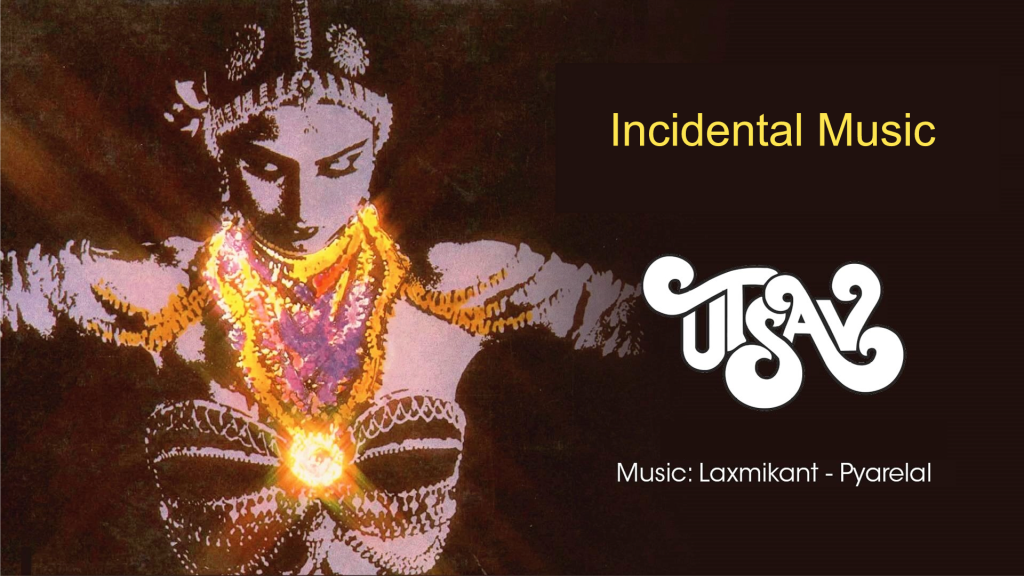
It was usually not the norm to release the background music of Hindi films, like we see in the Hollywood counterparts, but we were fortunate that CBS records realised the beauty of the background musical pieces that Laxmikant Pyarelal had composed for Utsav, and released three ‘Incidental Music‘ pieces on the LP. These were however excluded from the CD releases by BMG Crescendo and HOM Records; a common instance that i completely deplore. Why, you may ask? These musical piece further cement the complexity of what Laxmikant Pyarelal had composed for Utsav, they add to the complete listening experience that transports the listener to era of Utsav. And why exclude these pieces that will allow the listener to have a complete aural Utsav experience? These tracks are also not available online, so i will add them as we delve into their genius.
Incidental Music – 1
At 1.18 minutes long, this beautiful piece extends on the Raga Vibhas pieces that we hear in the Soundtrack, carefully composed, the piece intends to explore a sudden happiness as shown by the Sitar in the beginning, its a flourish of pure happiness. Its when the Flute begins, and the Sitar fades out that we begin to understand that the happiness maybe short lived. The Flute extends the notes of Raga Vibhas with superb rendition, flow of the Meend and Chalan are exemplary. The Violin towards the end add a catastrophic melancholic feel. Jai Ho Laxmikant Pyarelalji!
Incidental Music – 2
This track is not based on any Raga but created out of the minds of the Genius Laxmikant Pyarelal. But hear how they expound a fully realised joy in this 1:32 minute piece. The feel gravitates to one’s heart dancing. Comparatively to the first piece, we get the same instruments; Sitar and Flute with the addition of the Tabla. But see how the melody is created that allows the listener to feel Laxmikant Pyarelal’s instinctive composing method.
Edit** It was pointed out to me that this piece was in fact composed out of Raga Bhoop. Thanks To Bhakti Tharoor for the informative advice that allowed me to enhance this beautiful composition review. This piece was used as the introduction or Title Music of Utsav. It is Indeed Raga Bhoopali. Being partly soaked in Raga Vibhas while i did this review caused me to overlook this.
Incidental Music – 3
In Addition to the masterpieces that Laxmikant Pyarelal have created out of Raga Vibhas for Utsav, they were brilliant enough to compose a complete instrumental of the Raga, with Alap and Jod in Ektaal, just so listeners could experience the complete picture. Here the feeling swings in a pendulum between anxiety and excitement. Sitar, Santoor, Flute are the main instruments with a nifty Tabla composition in Ektaal. Each instrument is given time to explore that pendulum of emotions, and that already says a lot since the track is just 2:46 minutes long.

Times have changed dramatically in terms of Bollywood, we hear less and less of these types of compositions in today’s times. It also doesn’t help that Bollywood unflinchingly discards everything about a film the moment it flops, including all the technical merit; and lots of great films have flopped. Thankfully you cannot keep great merit down by only a reflection of revenue generated. Utsav is proof of this; which has a cult following of its movie and music. Girish Karnad, the film’s director had great sense of feel with Utsav and it is there for everyone to see and hear. A great actor himself, led his cast and team with sound guidance.
Laxmikant Pyarelal remain a force to reckon with, even today, years after they stopped composing. Last year (2019) alone saw many of their songs being remade, not that i appreciate the remakes, but the Composers popularity still stands strong. They created anthems for the nation and actors that created hysteria, soulful songs that represented all relationships and they remained on the hearts and lips of Everyone. Utsav carried the same appeal and whilst its popularity only grew as time passed, Its class and quality remain constant.
The Singers that featured in Utsav:
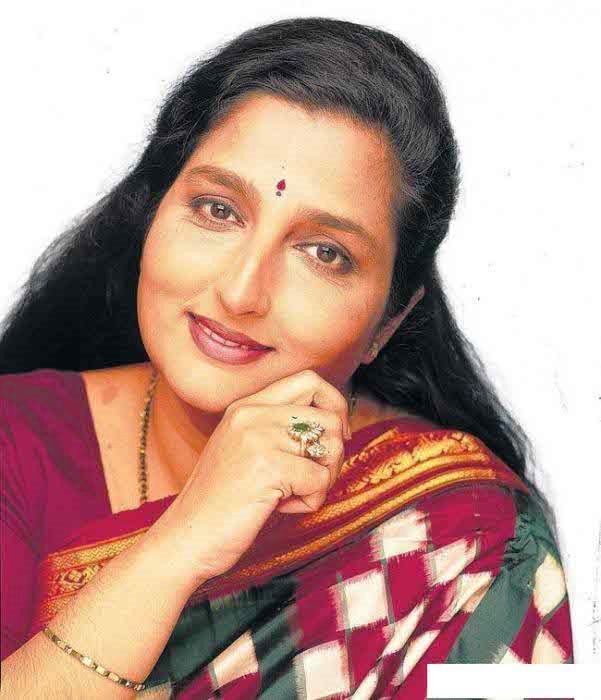
Anuradha Paudwal 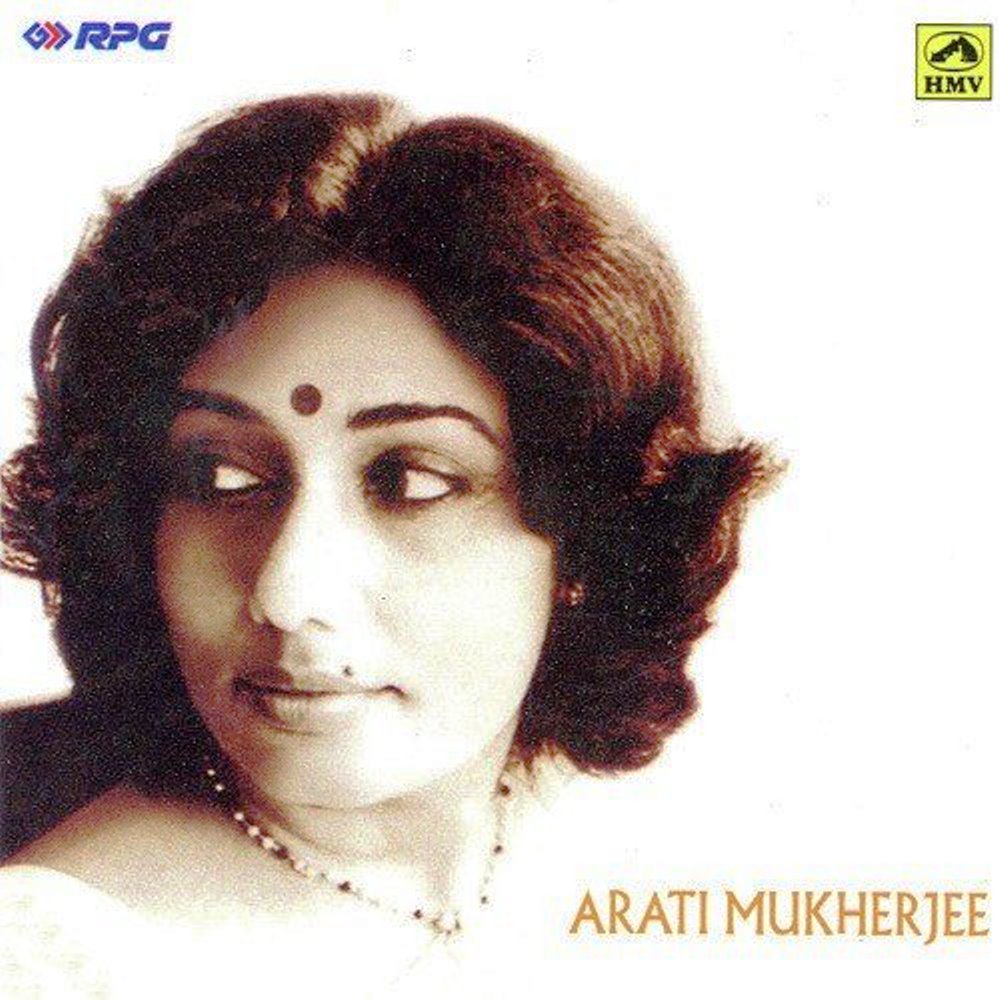
Arati Mukherjee 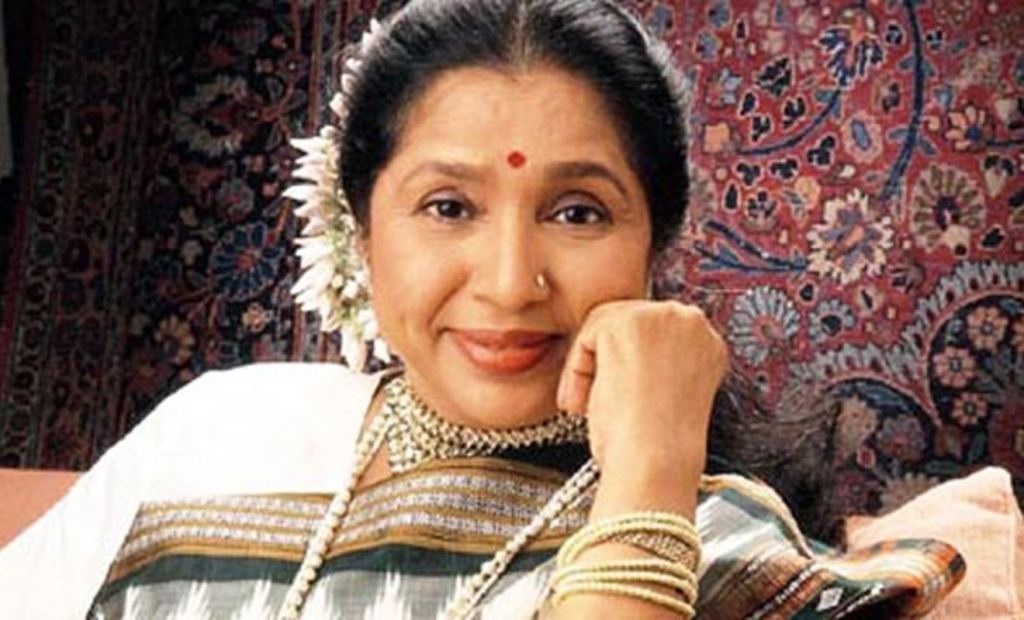
Asha Bhosle 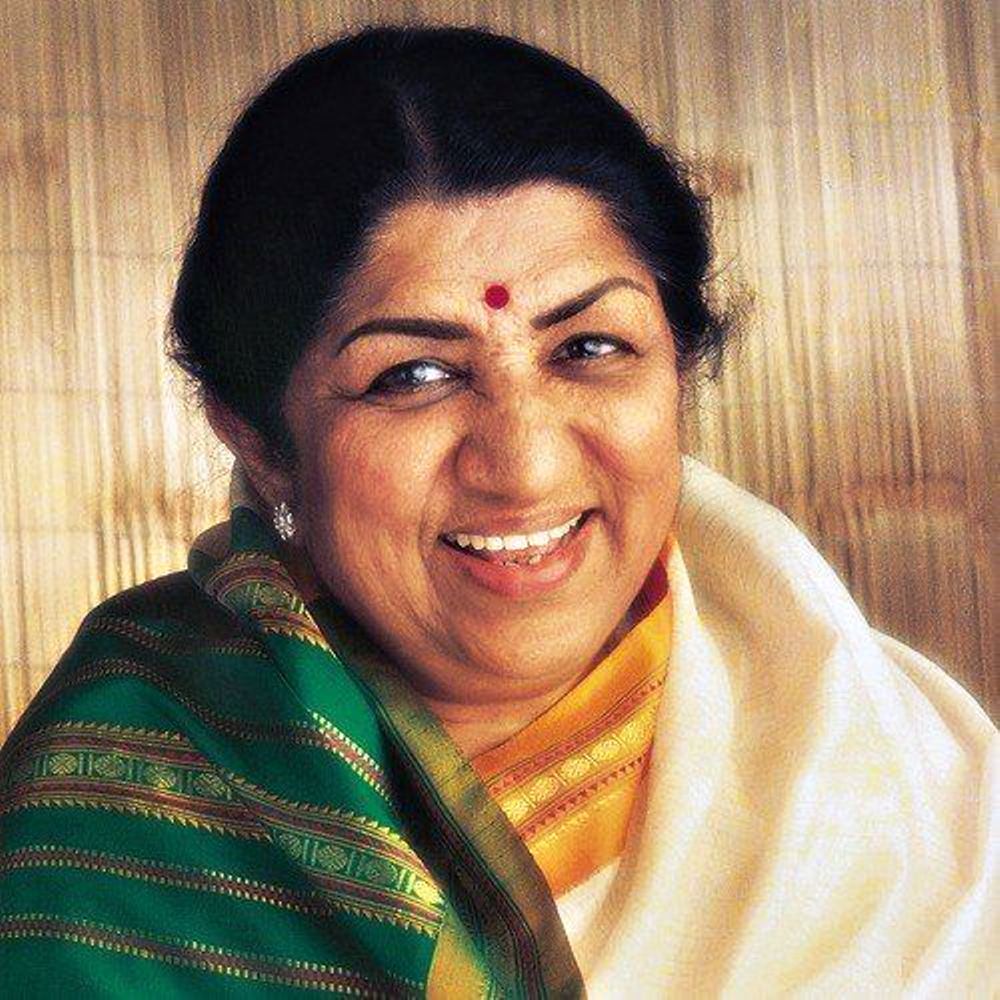
Lata Mangeshkar 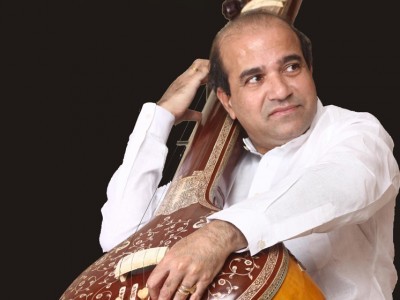
Suresh Wadkar 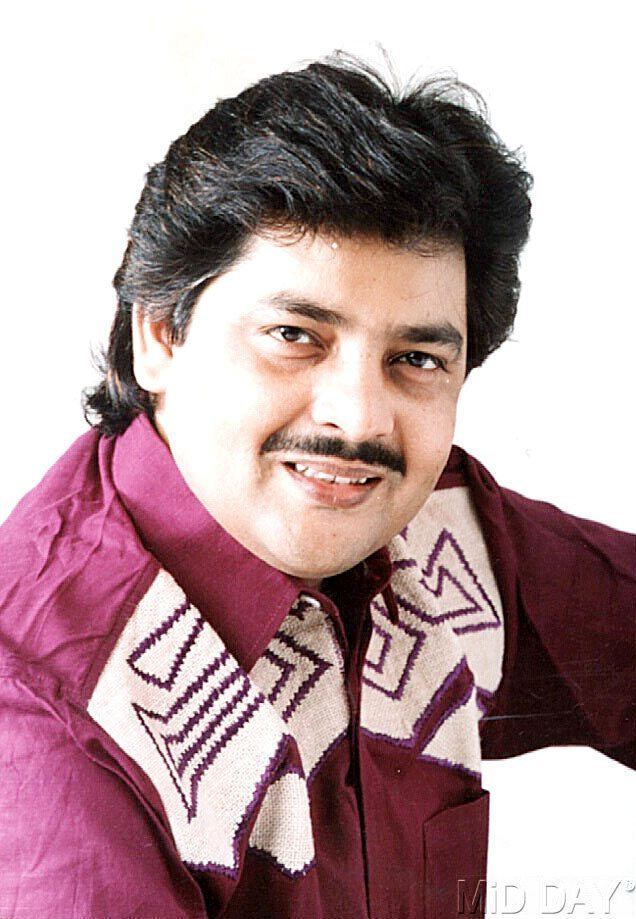
Udit Narayan
Utsav Scores 9 Stars
Rating
★★★★★★★★★
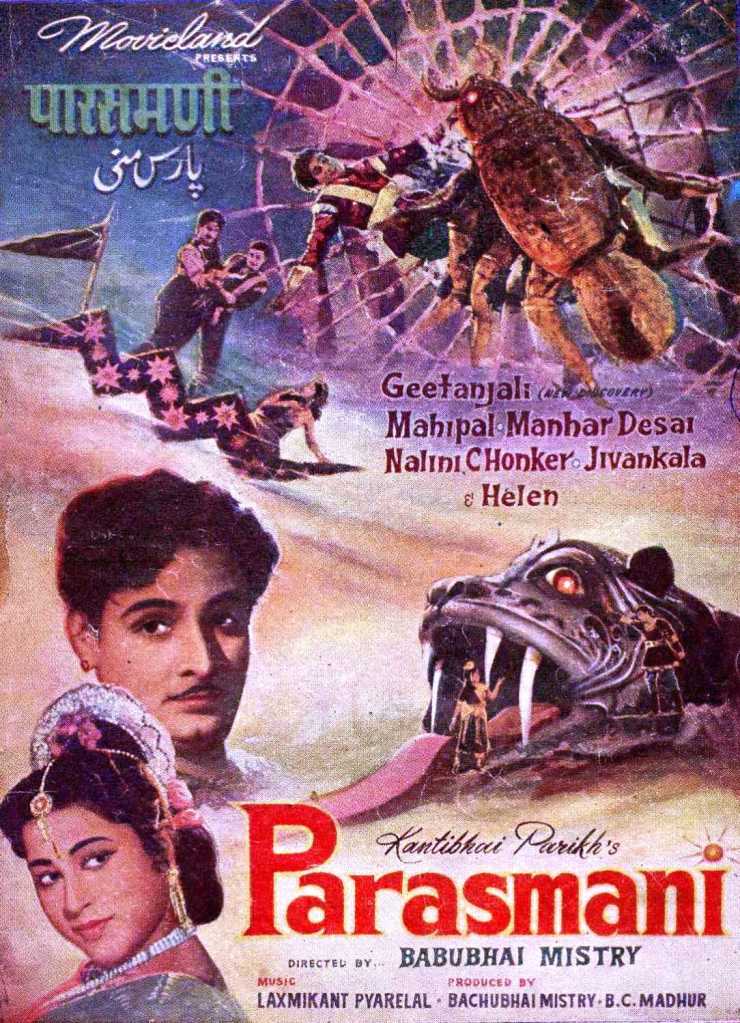
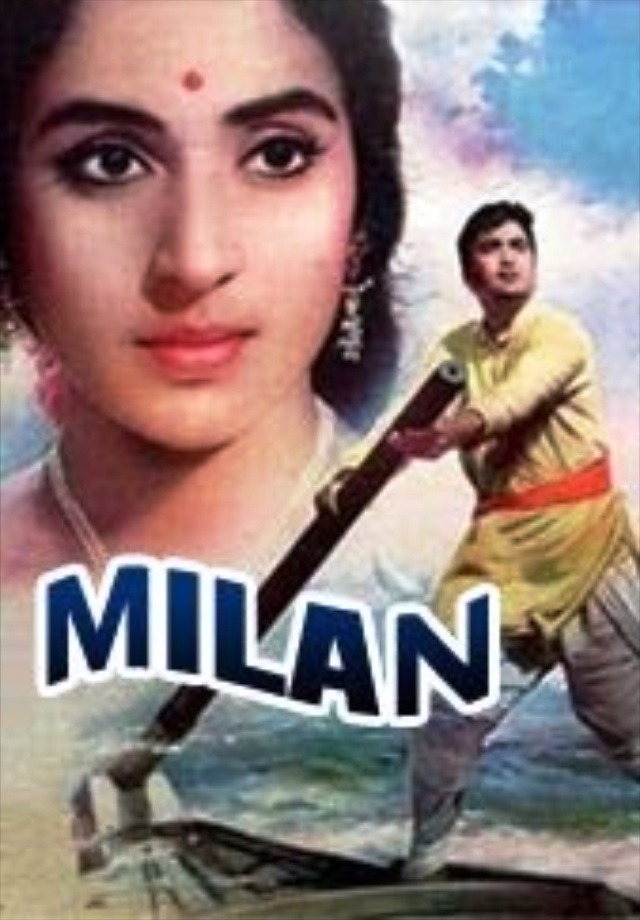
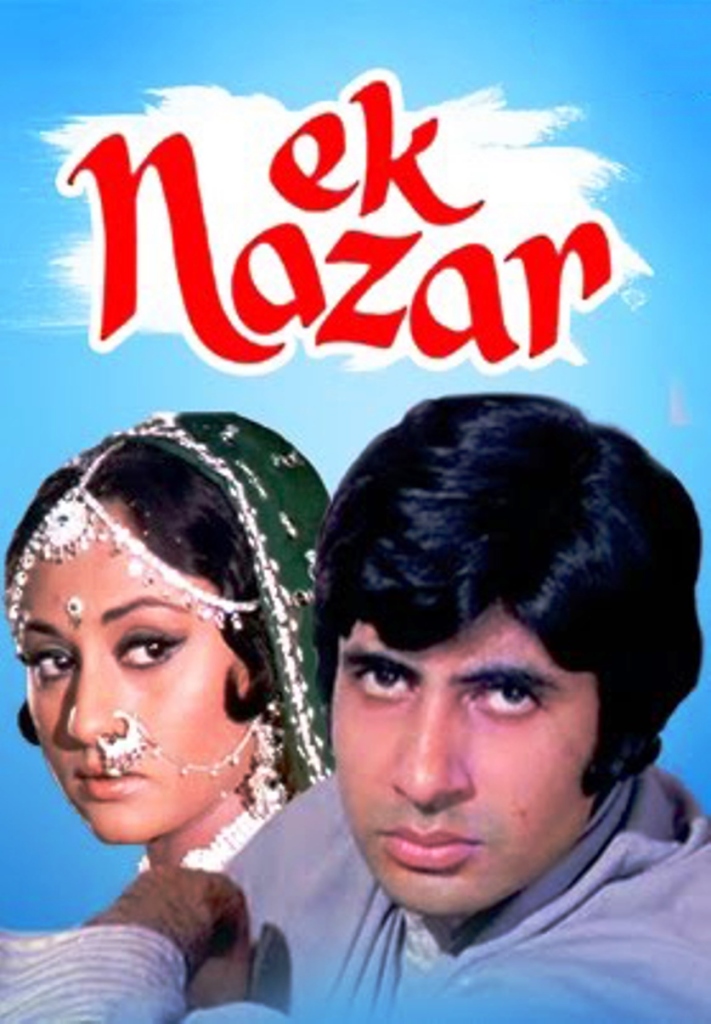
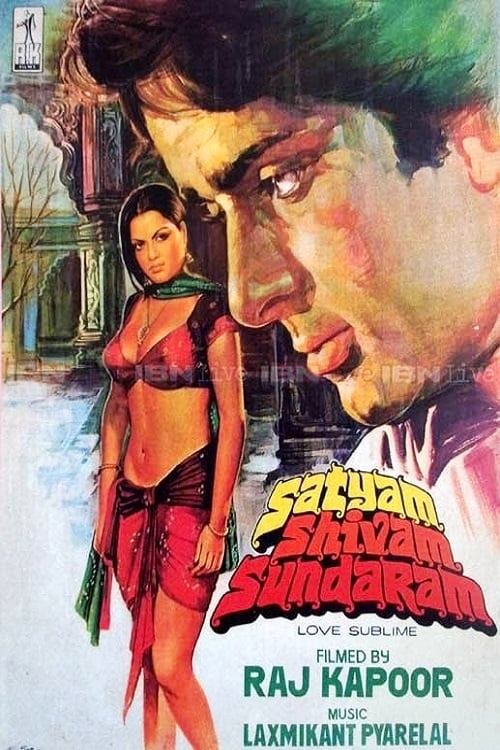
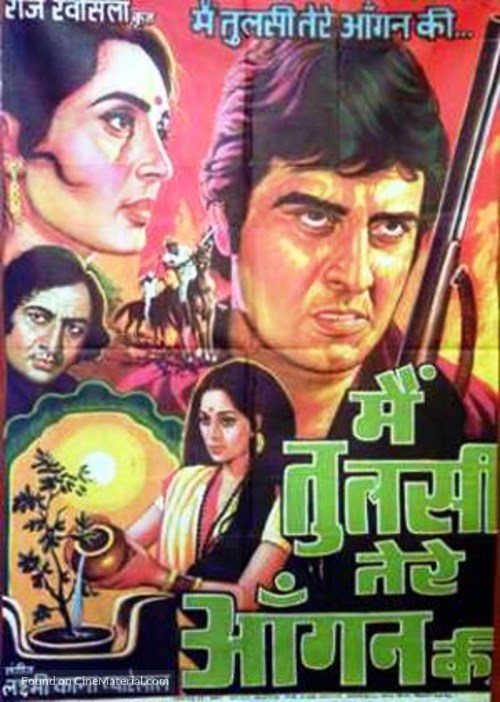
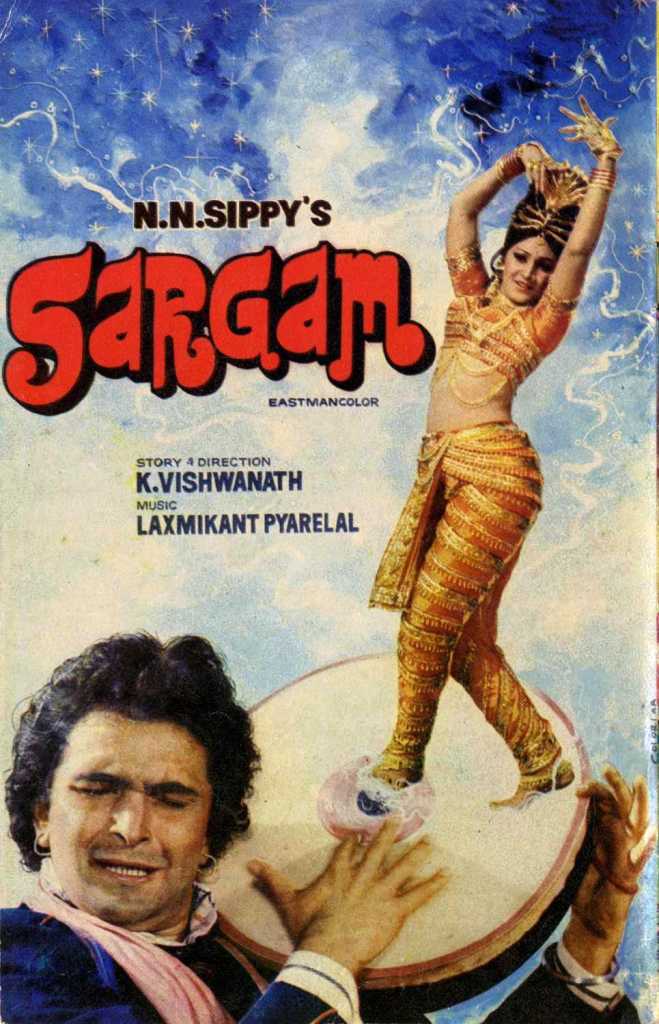
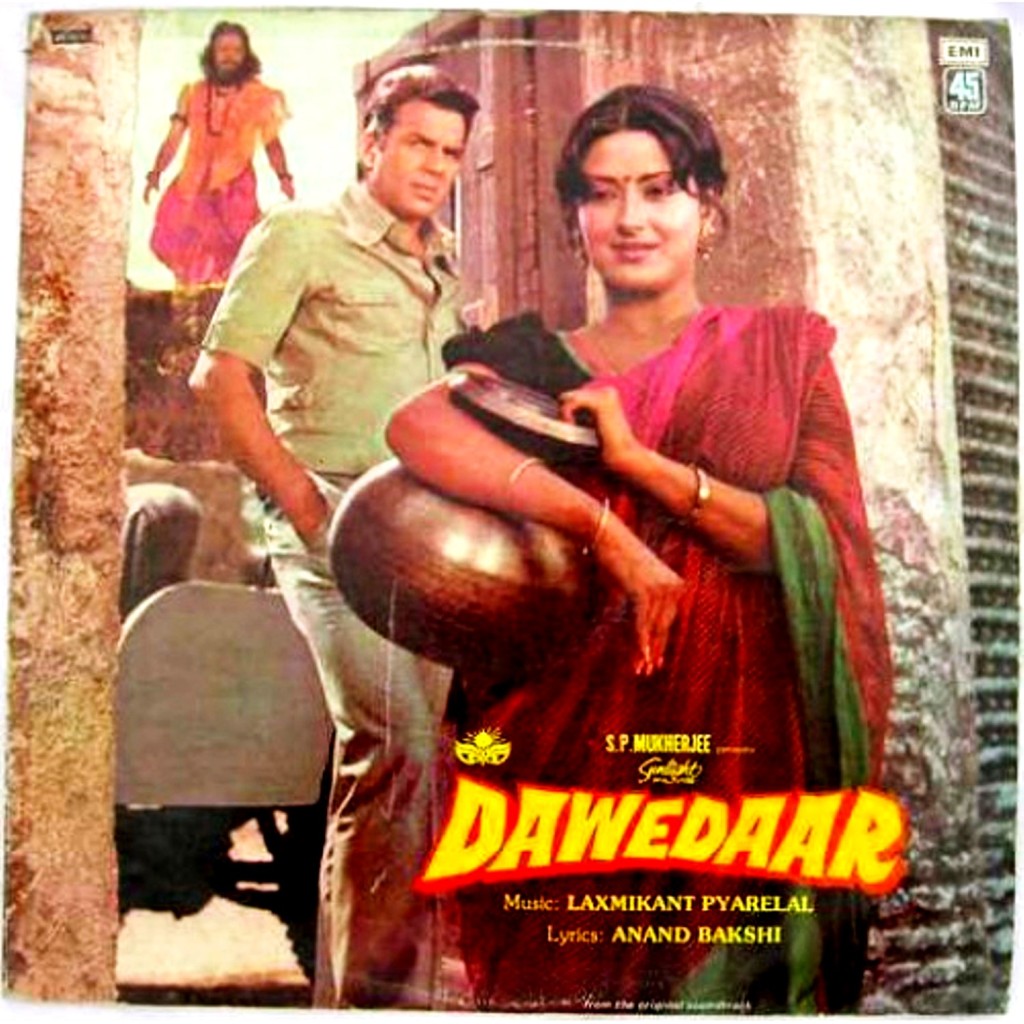
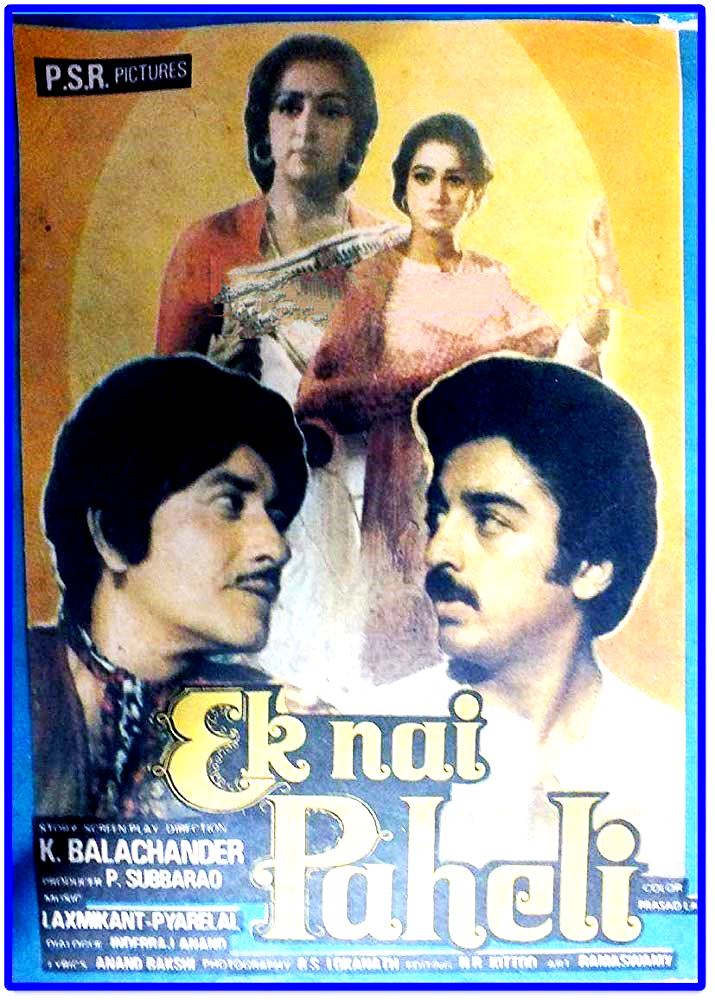
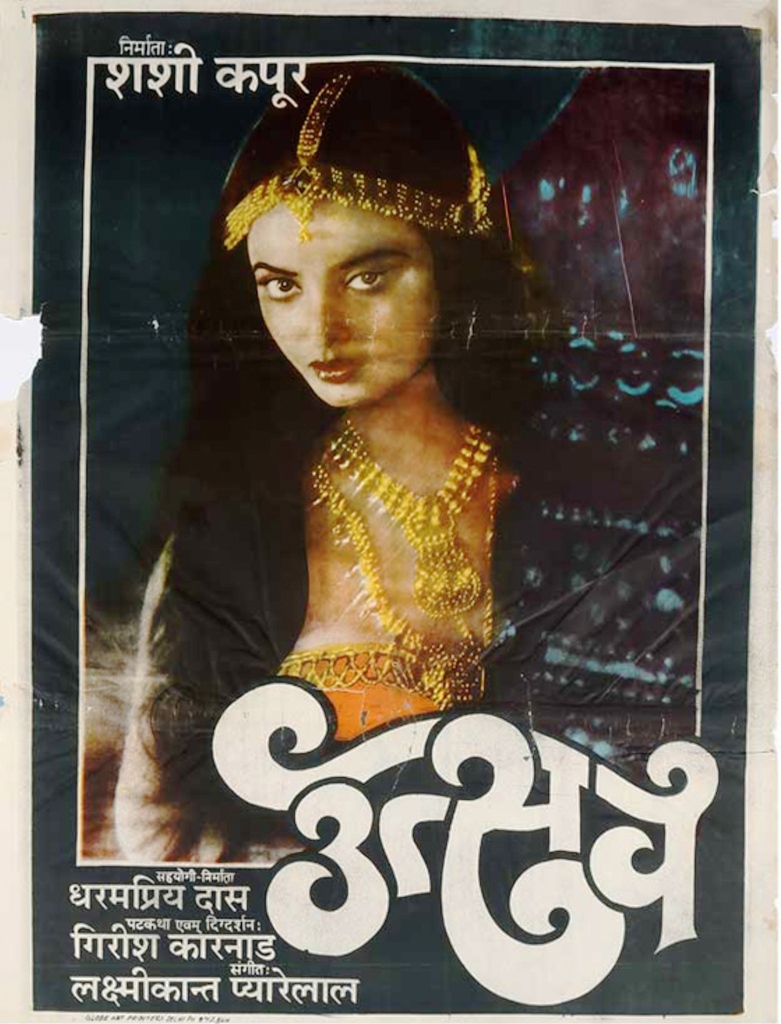
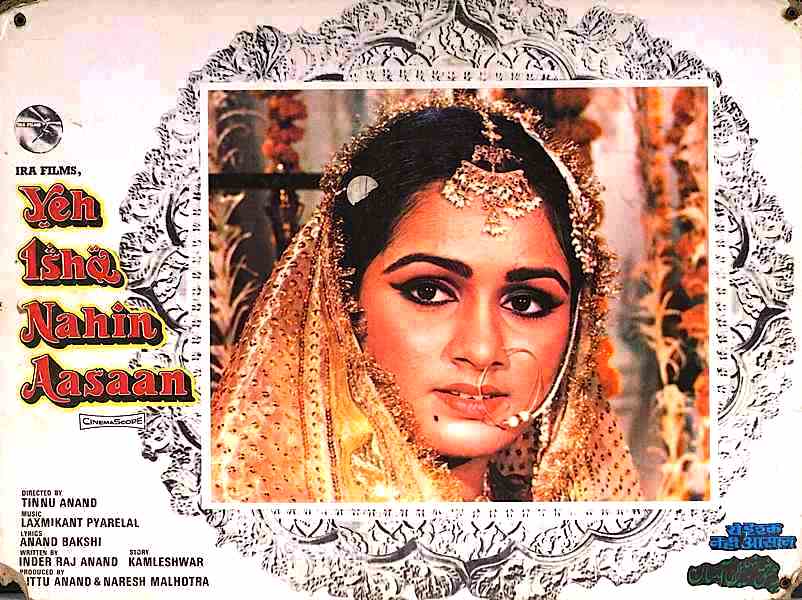
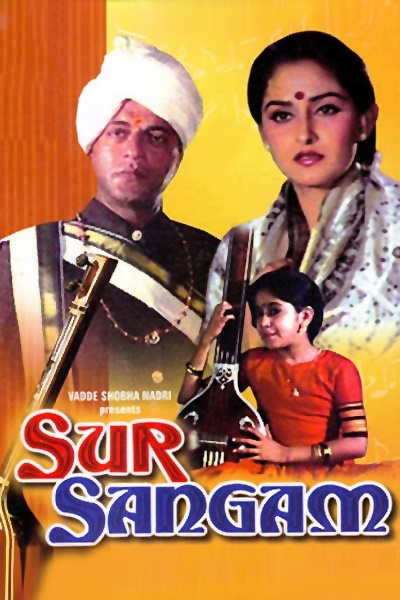
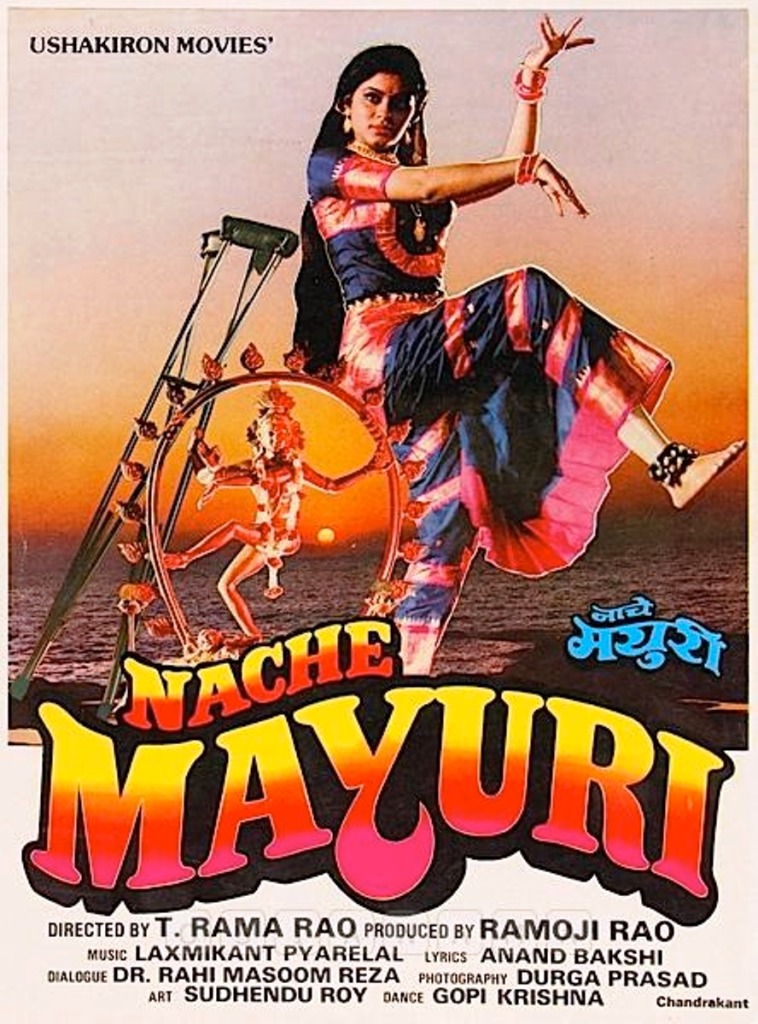
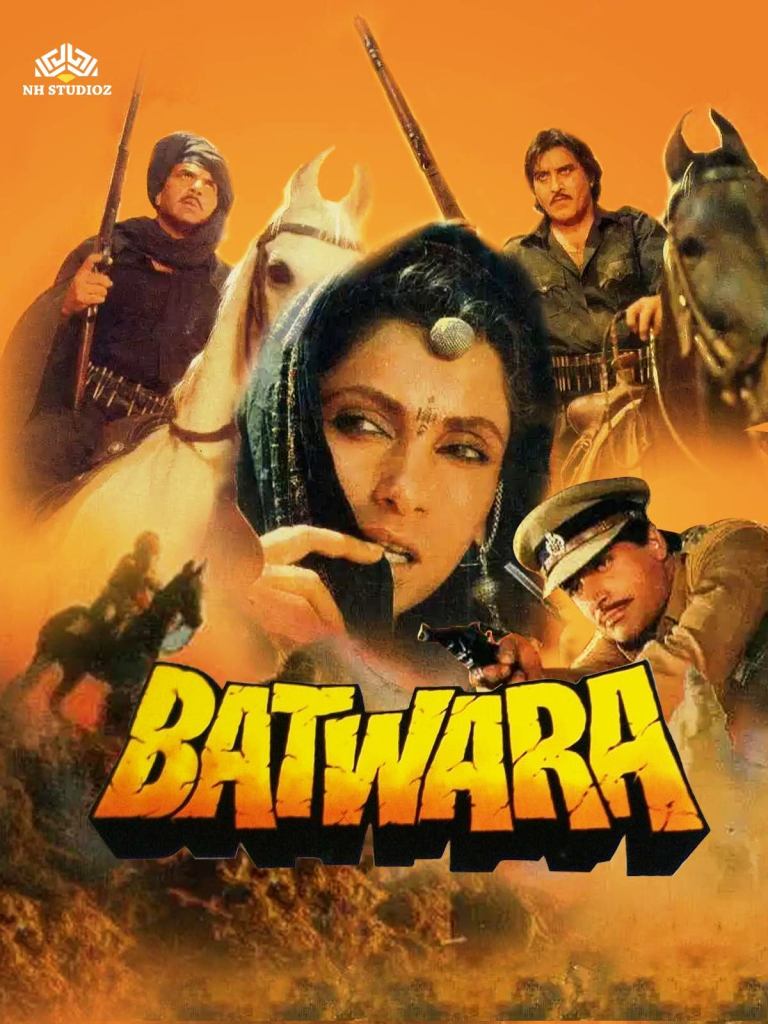
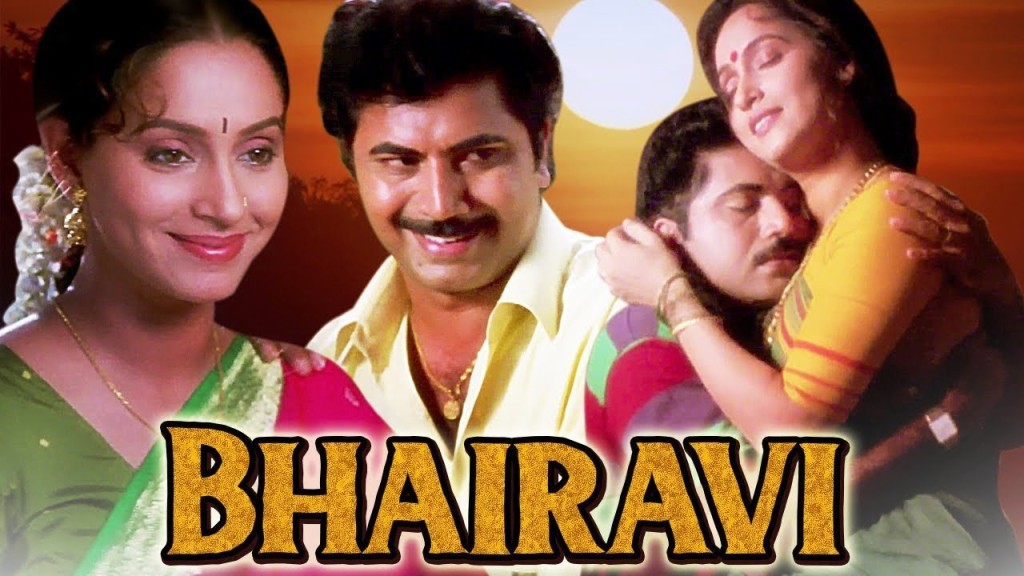
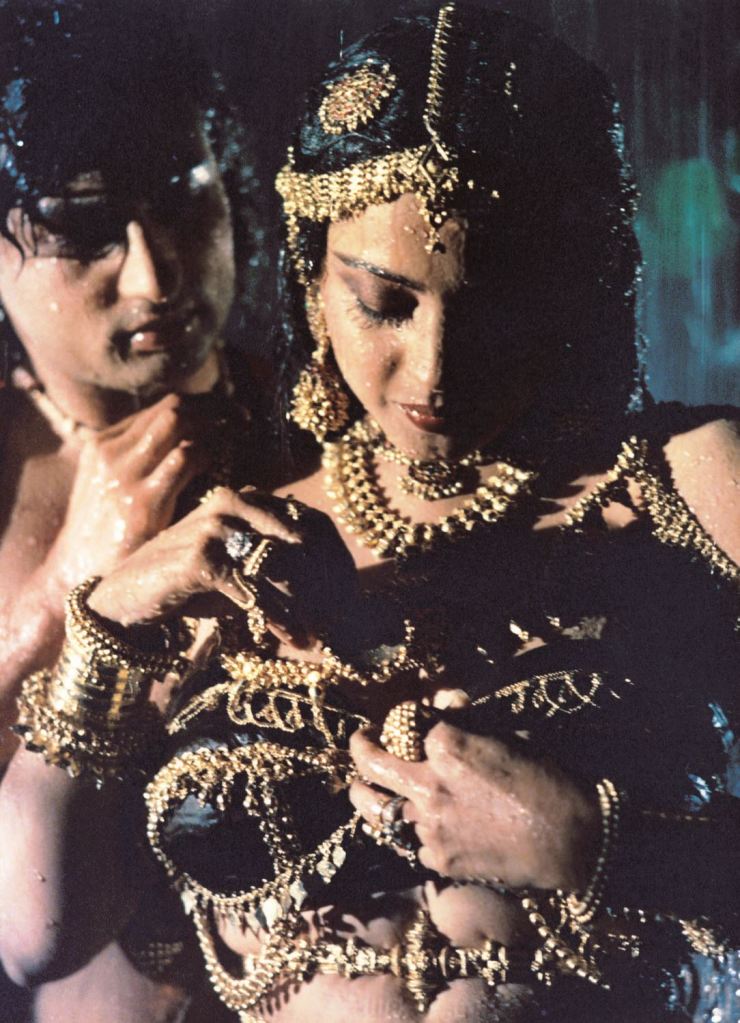
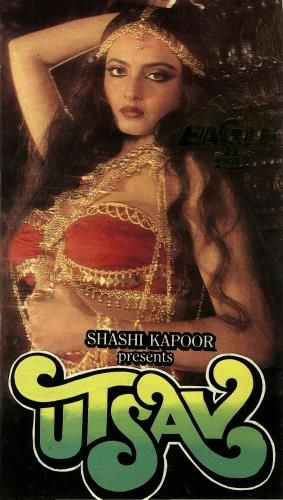
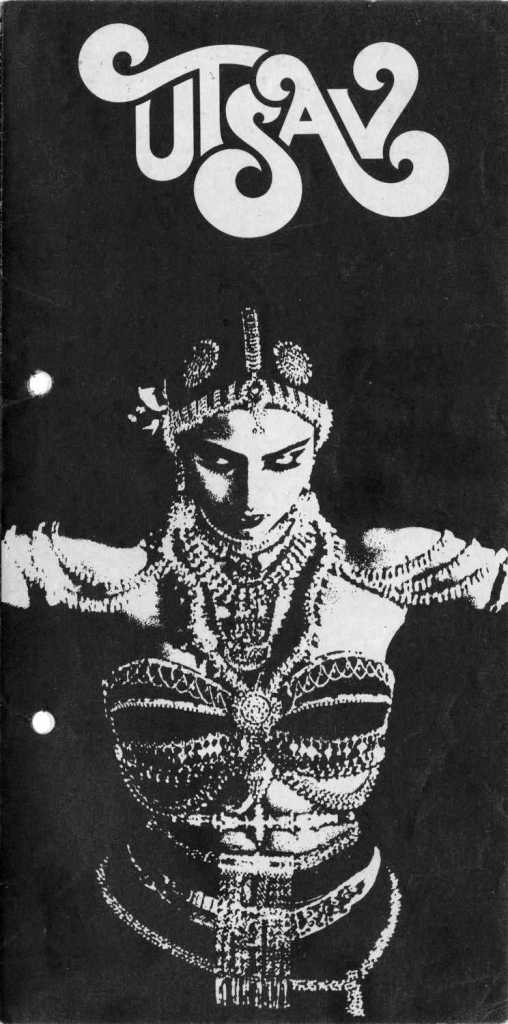
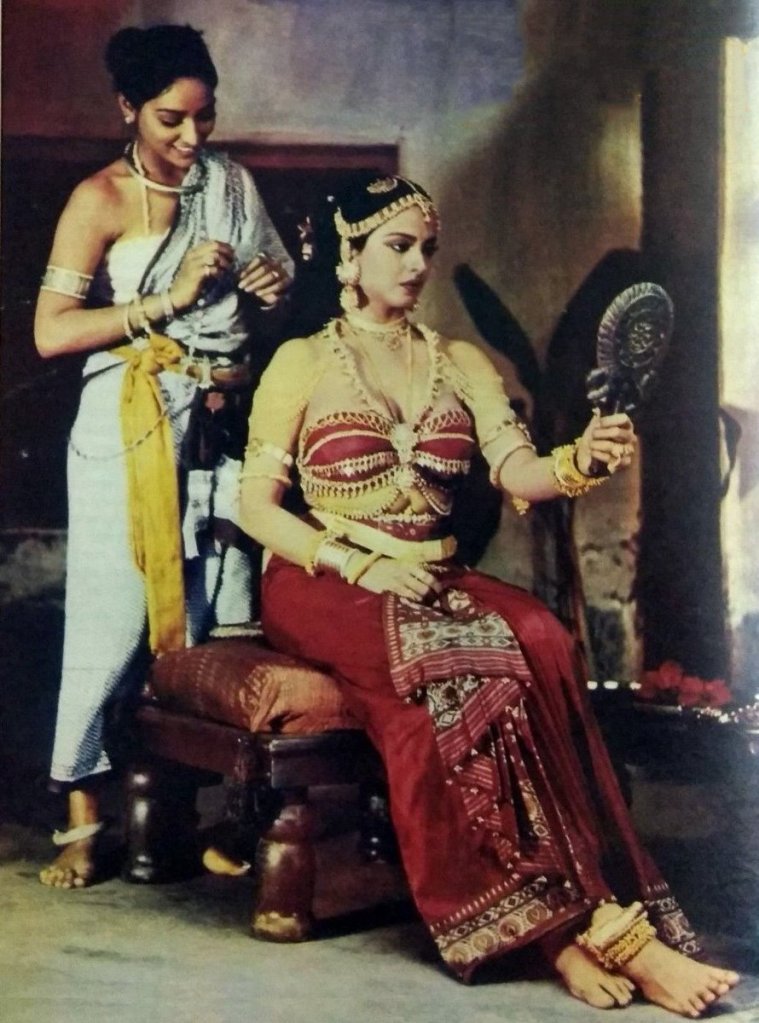
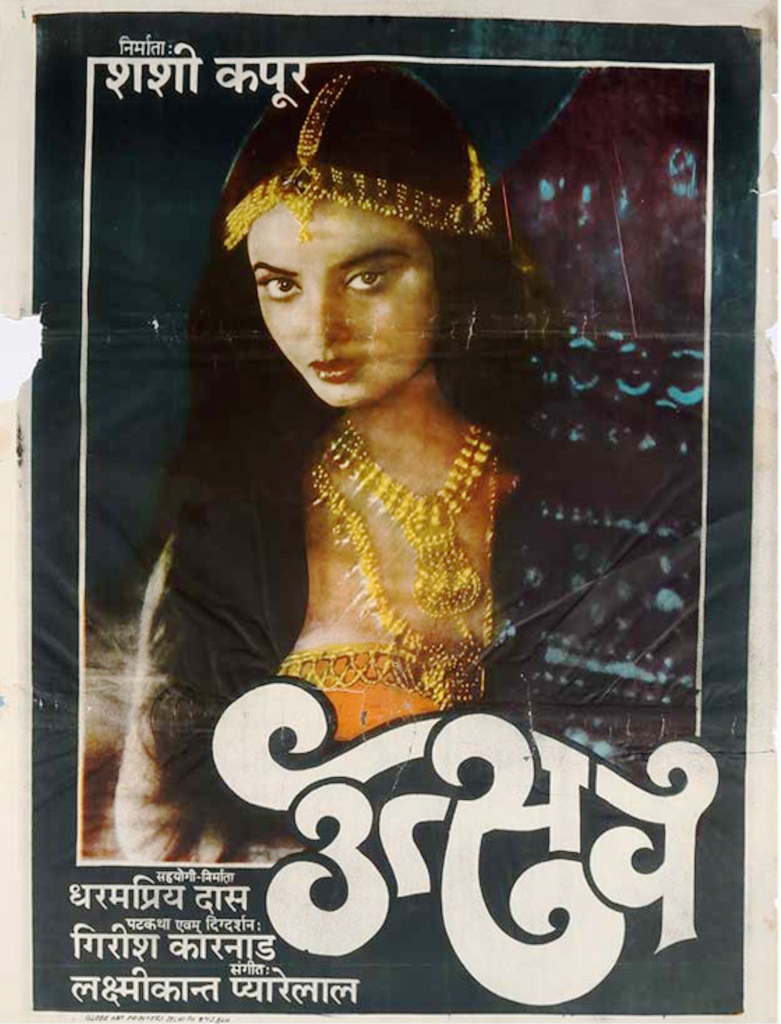
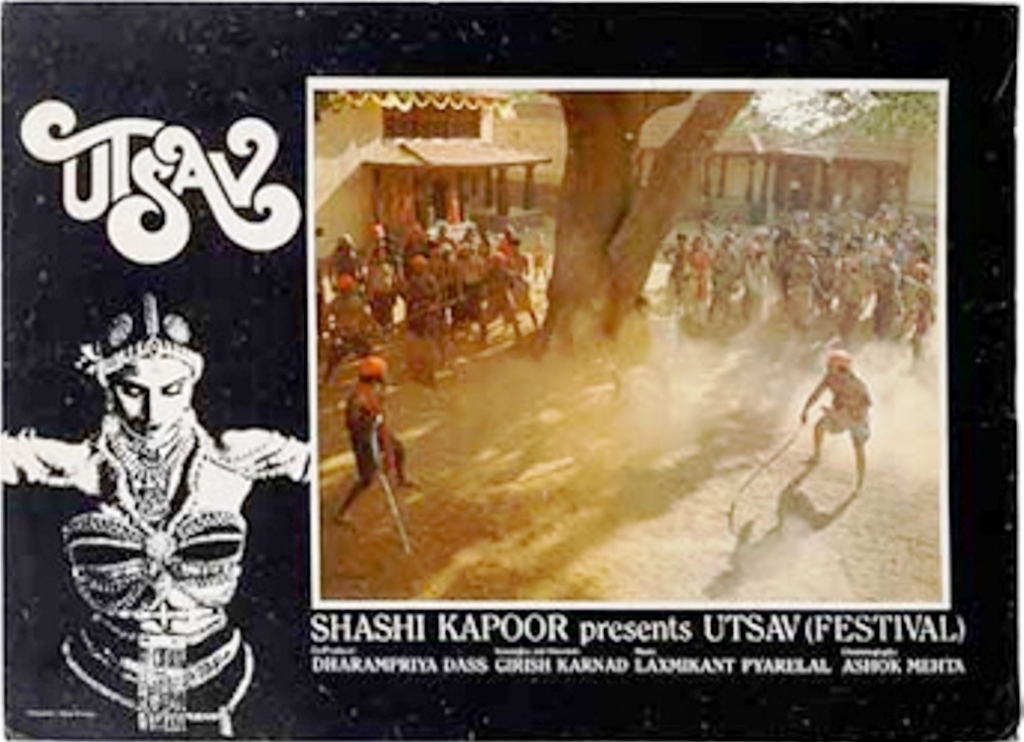
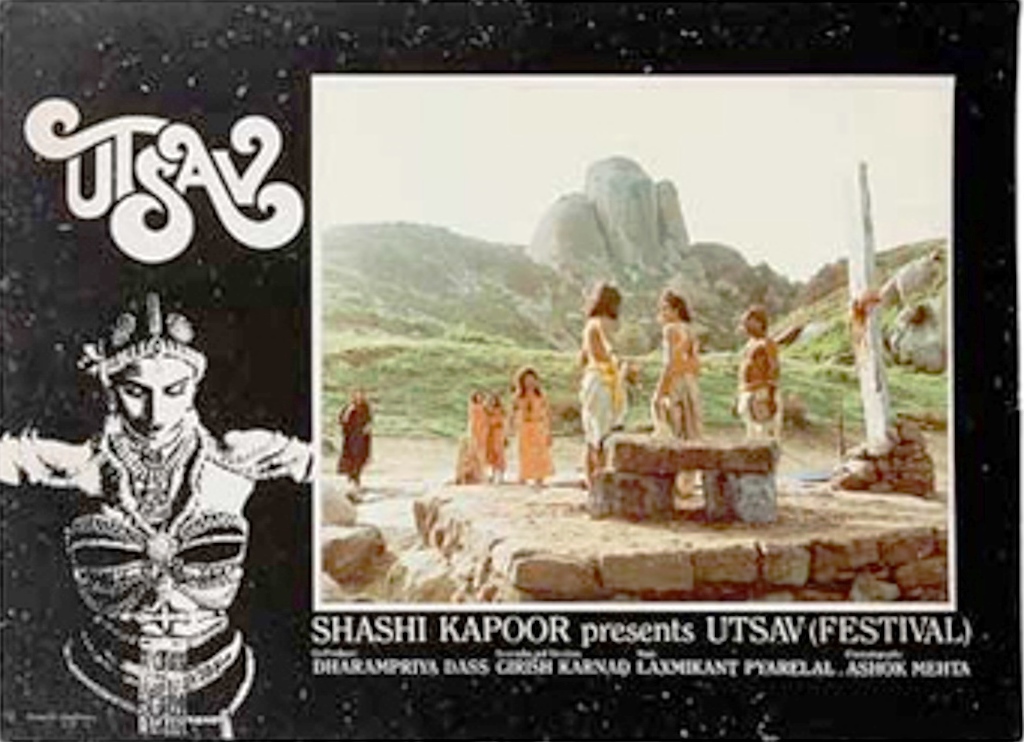
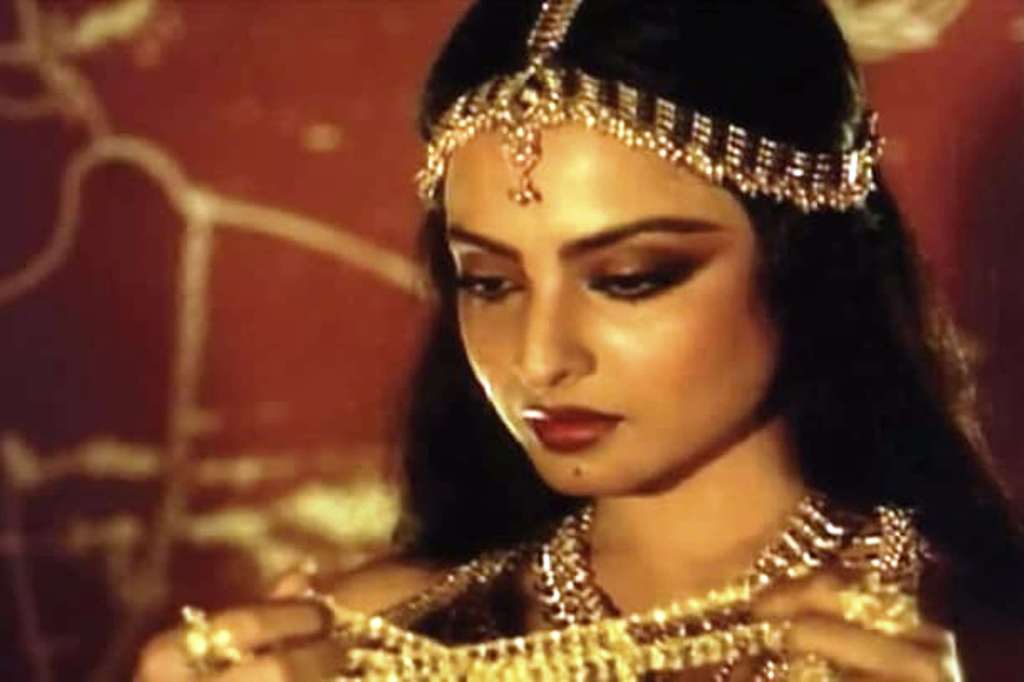
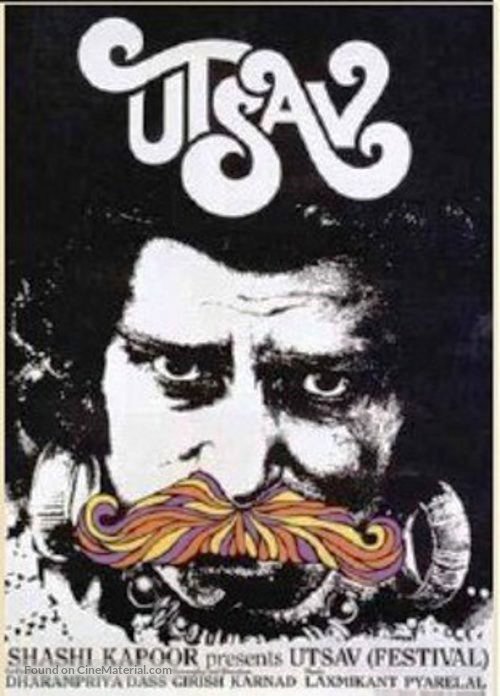
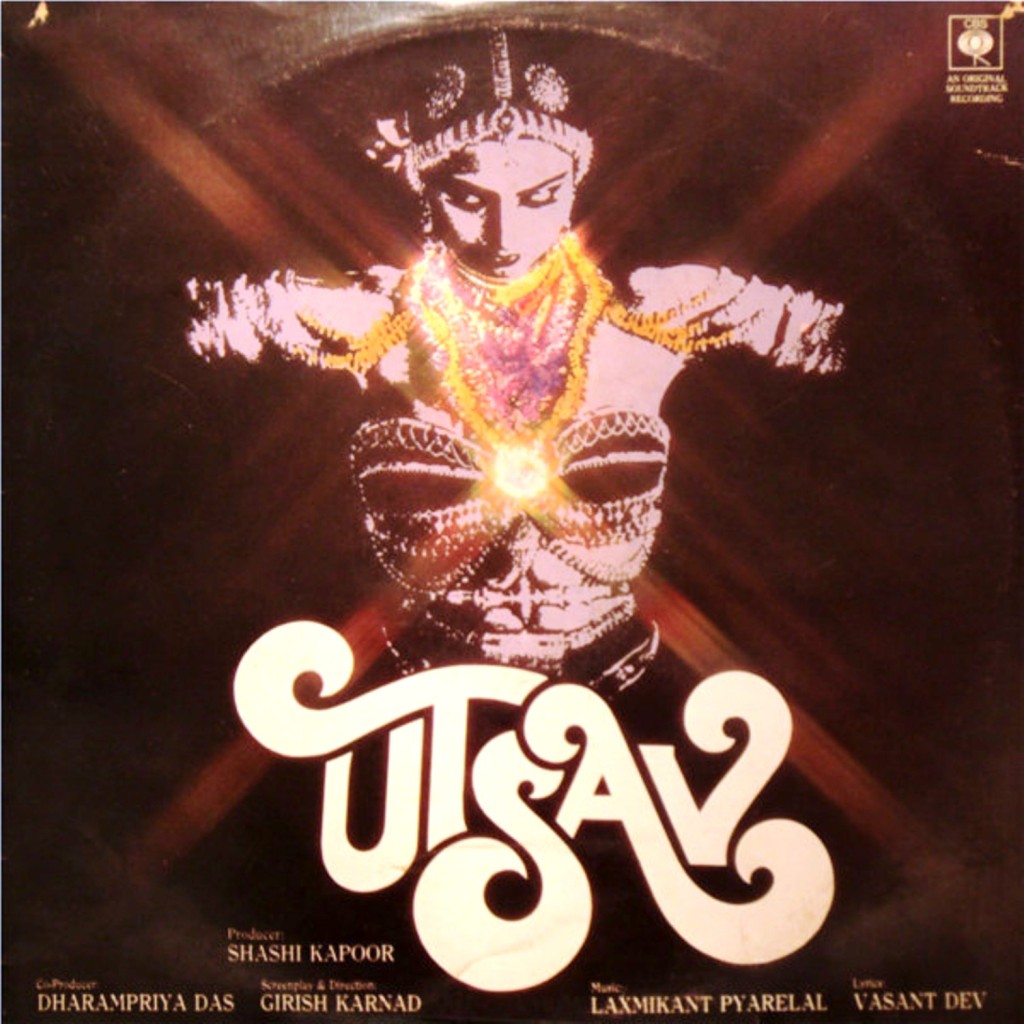
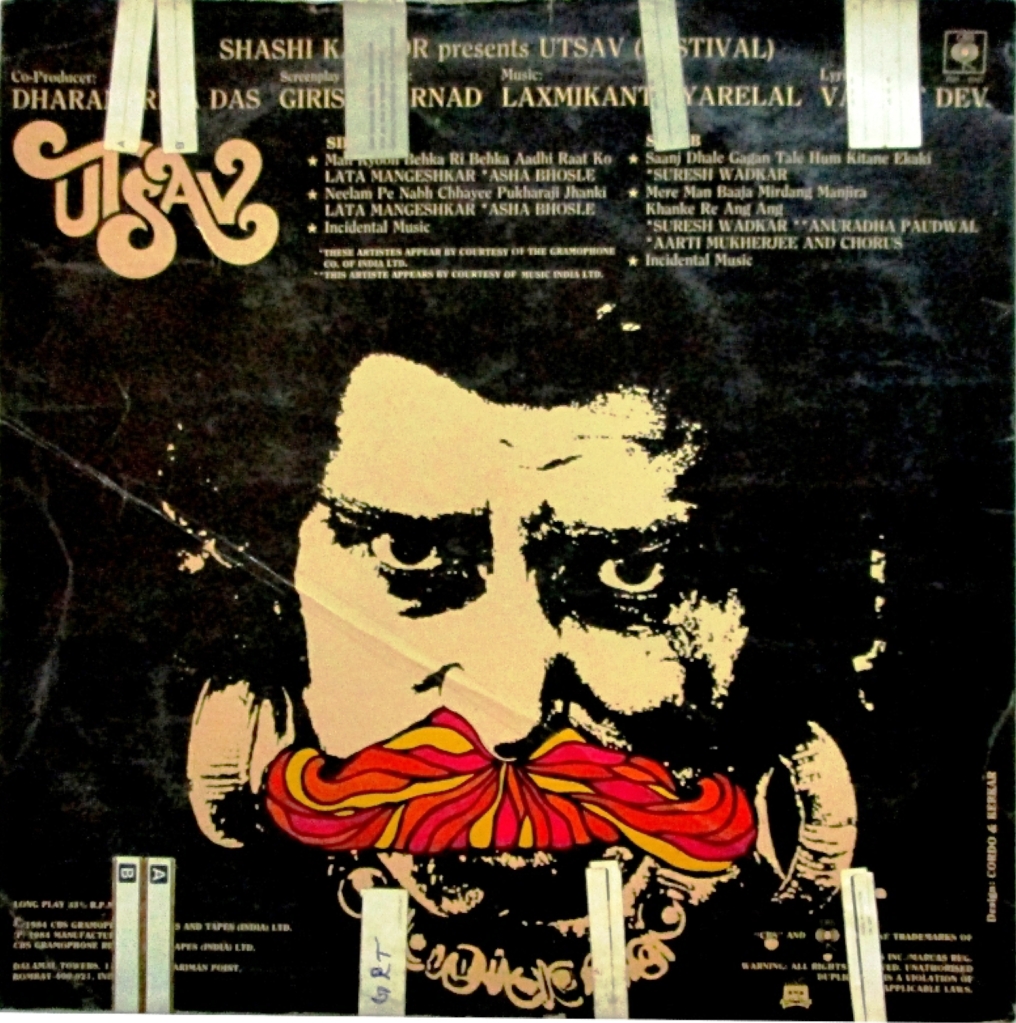
Though the work of great two music masters ‘LP’ is outstanding, & timeless which you rightly presented; but I must salute your efforts & passion to take utmost all the efforts to gather the same with minutest details. It is indeed a bonanza for me to hear, read & learn about the work of all time great LAXMIKANT & PYARELAL…..
LikeLike
Thank you for the beautiful compliment. When you have a body of work, like Laxmikant Pyarelal’s, then it is the most enjoyable experience writing these reviews. Glad you enjoyed it Sanjeev 🙂
LikeLike